Red Moon Blue Sun: Episodes 31-32 (Final)
by odilettante
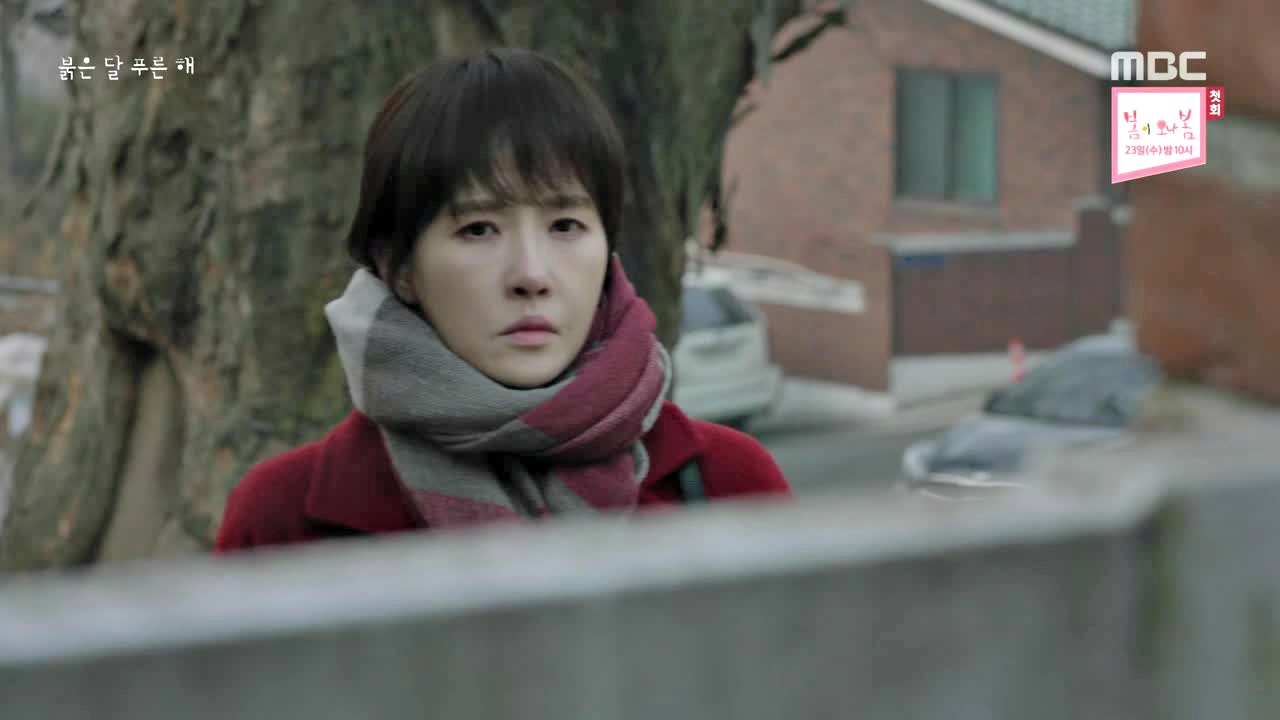
The final episode means our heroes have no choice but to face the truth about Red Cry and the little girl in the green dress. While this drama may not have been the easiest to watch due to its bleak and disturbing subject matter, it has been one of the most gripping and intriguing shows I’ve seen in a long time, and, unlike Woo-kyung’s childhood memories, will remain with me for a long time.
FINAL EPISODES RECAP
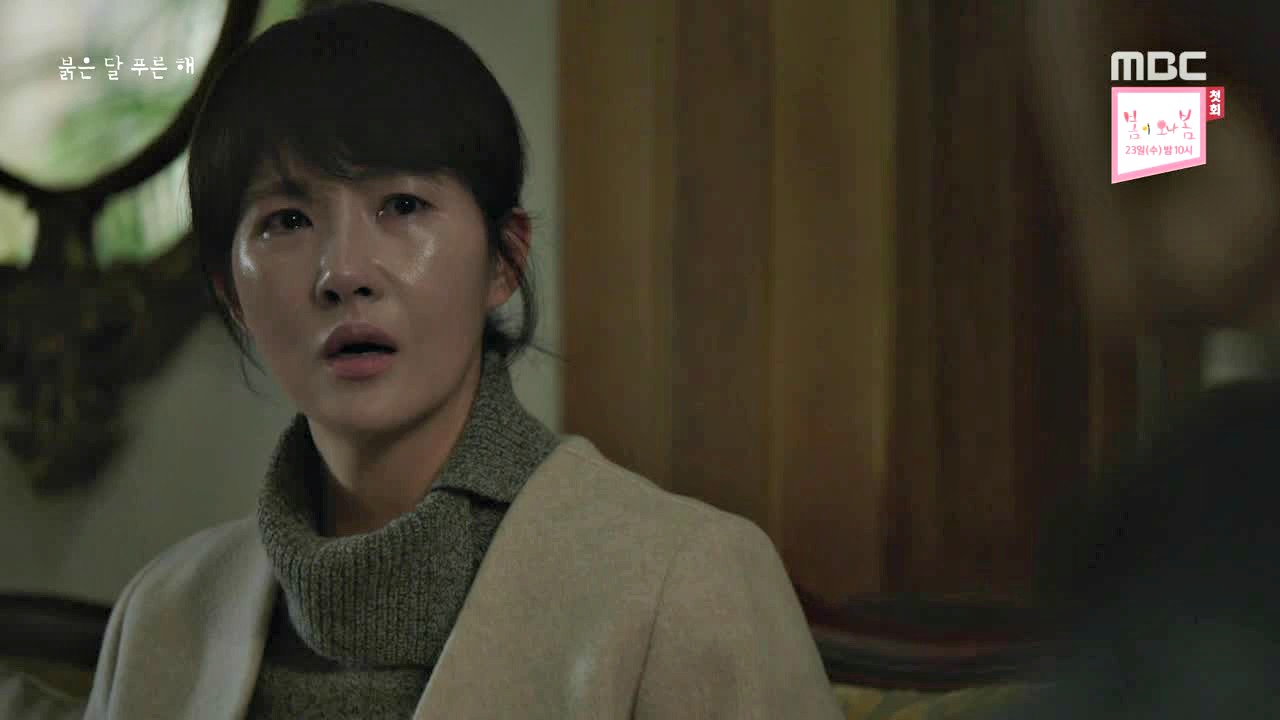
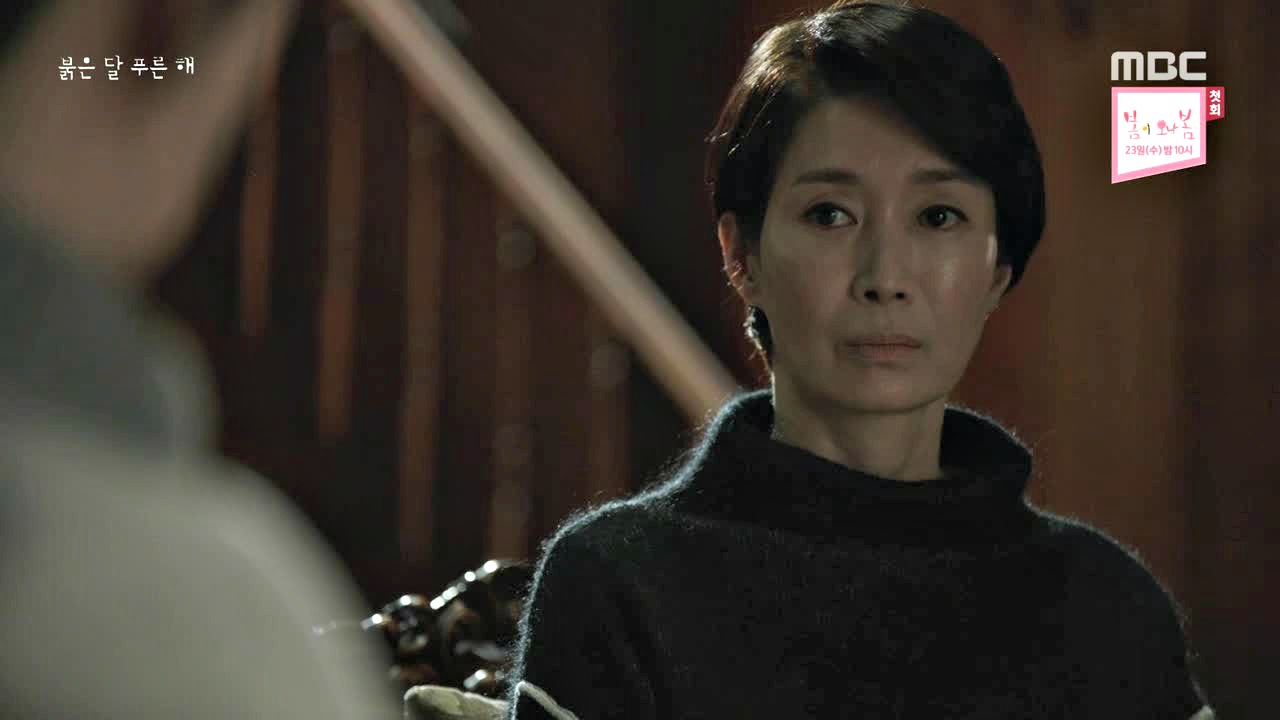
Confronting her stepmother, Woo-kyung accuses her of killing the real Se-kyung. Woo-kyung reveals that her memories have returned. Mom explains that it was a struggle trying to keep the child Se-kyung clean, and that during one of the baths, Se-kyung caught pneumonia and died.
Woo-kyung wearily points out that Mom is hiding the truth yet again, having just changed her story from losing Se-kyung at the amusement park to her dying due to pneumonia. But Mom insists the death-from-pneumonia story is true — besides, it’s not like Woo-kyung can prove anything different.
Arrested and taken down to the police station, Dr. Yoon — in his calm, affable way — explains to Ji-heon that he pretended to not know Eun-ho was his brother because he didn’t want to worry his other patients, because it wouldn’t look good being related to a murderer.

Dr. Yoon insists that he only found out about Eun-ho a few months ago when Eun-ho made a delivery on behalf of the children’s center. Recognizing Eun-ho’s name, Dr. Yoon asked if he was the same boy from the orphanage where Dr. Yoon and the baby Eun-ho had been transferred after being found at the pier. Their reunion was more awkward than emotional, since they were essentially strangers.
The doctor knows that being related to Eun-ho isn’t a crime, and laughs at the idea that Ji-heon suspects him of murder just because Dr. Yoon has connections to the hospital where Shi-wan’s mother was going to start working after she and Shi-wan fled to America.
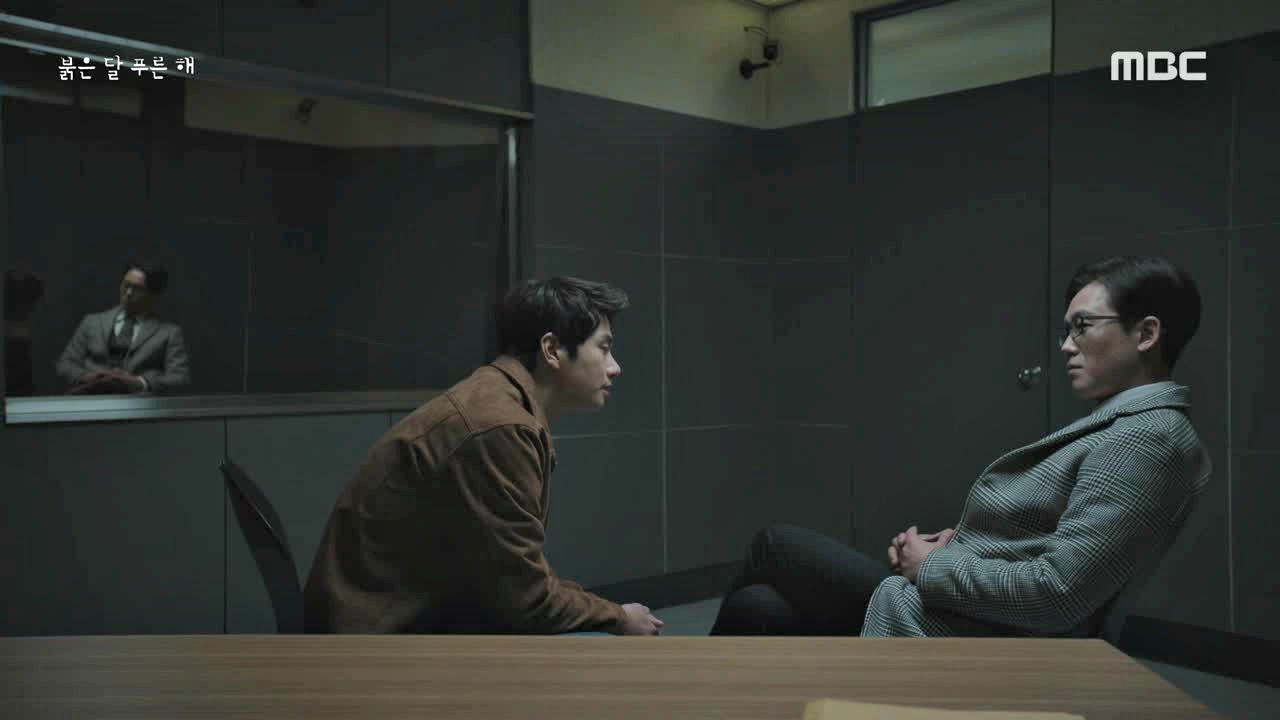
Realizing that Dr. Yoon isn’t going to admit anything, Ji-heon decides on a new approach. He orders Soo-young to leave the interrogation room so there’s no official record, then Ji-heon shuts off the cameras and locks the door. Taking off his badge, Ji-heon kicks the table away and sits close to Dr. Yoon, demanding to know if he’s pleased that Eun-ho took the fall for all those deaths.
Ji-heon weaves a story where Dr. Yoon was the true mastermind behind Red Cry. Dr. Yoon spins the story back around, pointing out that the real villain is Ji-heon who willingly sent Ha-na to go live with her horrible father. Eun-ho was the one who saved Ha-na. Plus, how can Ji-heon call Eun-ho a murderer when Ji-heon was the one who killed Eun-ho?

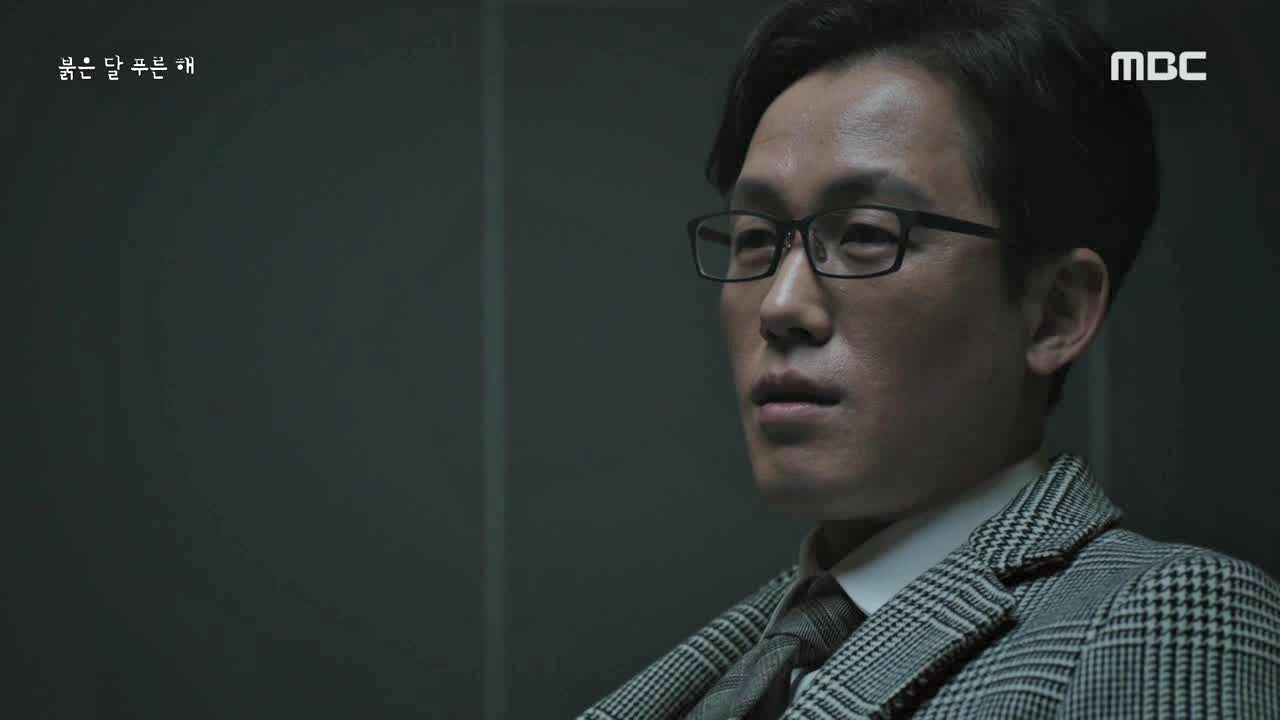
Pulling out his pen, Dr. Yoon starts to idly tap it in a rhythmically hypnotic manner as he persuasively reminds Ji-heon that when Ji-heon killed Eun-ho, he wasn’t proud to catch a murderer. Instead, Ji-heon felt guilty since he knew Eun-ho was in the right.
Dr. Yoon, in his smooth hypnotic voice, says that Ji-heon doesn’t really want to catch Red Cry, because Ji-heon knows that Red Cry can do what Ji-heon can’t. But the trance doesn’t fully work on Ji-heon, despite the tear that slips silently down his cheek.
Watch the video
You didn’t catch a criminal, you murdered a savior
Ji-heon snaps out of the trance, angrily accusing the doctor of trying to trick him. Laughing, Dr. Yoon says he thought Ji-heon was level-headed and rational — but Ji-heon’s actually quite emotional. The doctor adds that he doesn’t manipulate anyone — he merely speaks the truth. And one of those truths is that he’s not Red Cry.

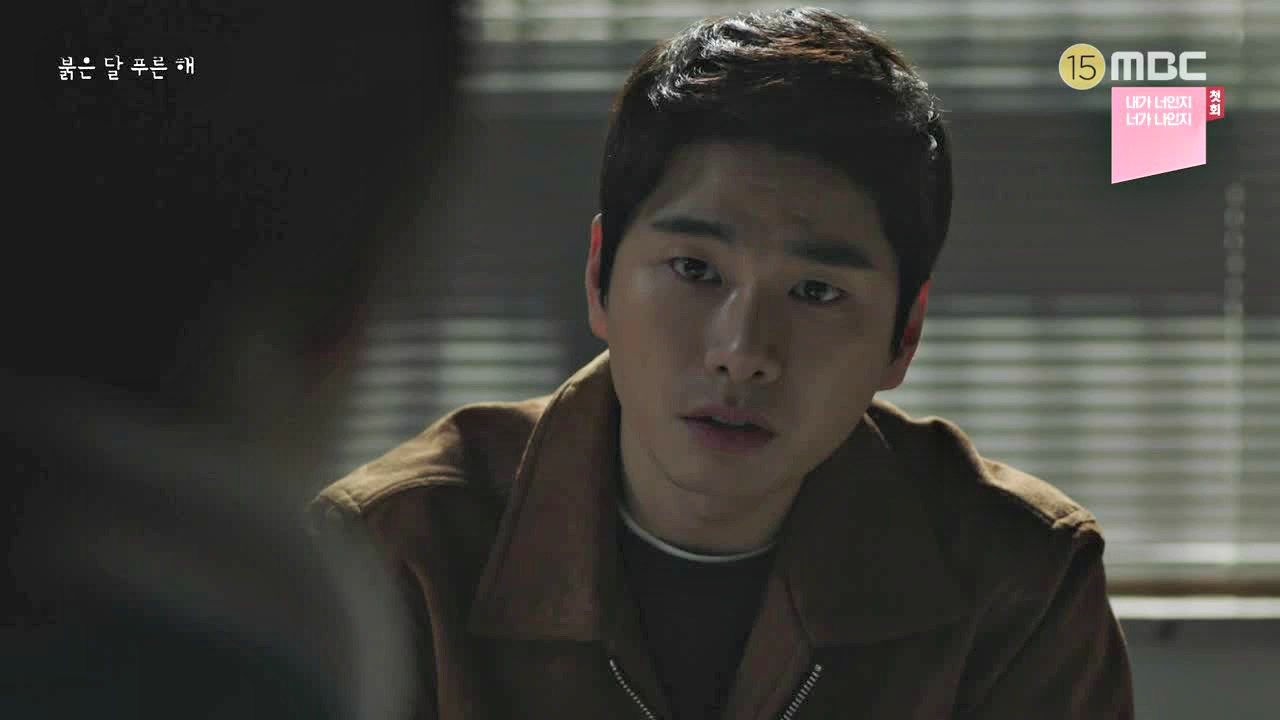
Ji-heon’s rattled by his encounter with Dr. Yoon, but he can’t hold the doctor without evidence, so Dr. Yoon is released. Ji-heon brings Woo-kyung in, revealing that Dr. Yoon is related to Eun-ho. He’s also convinced that Dr. Yoon is Red Cry, although Woo-kyung refuses to believe it. Ji-heon warns her to be careful around Dr. Yoon, anyway.
After Woo-kyung leaves the police station, she gets a message from Red Cry, telling her she needs to look for her sister’s body. Red Cry believes that Woo-kyung’s stepmother is a liar.
Woo-kyung goes to Dr. Yoon’s office and asks him why he hid the fact that he was Eun-ho’s brother. After all, she’s been the doctor’s friend since college — he could have at least told her about finding his brother.

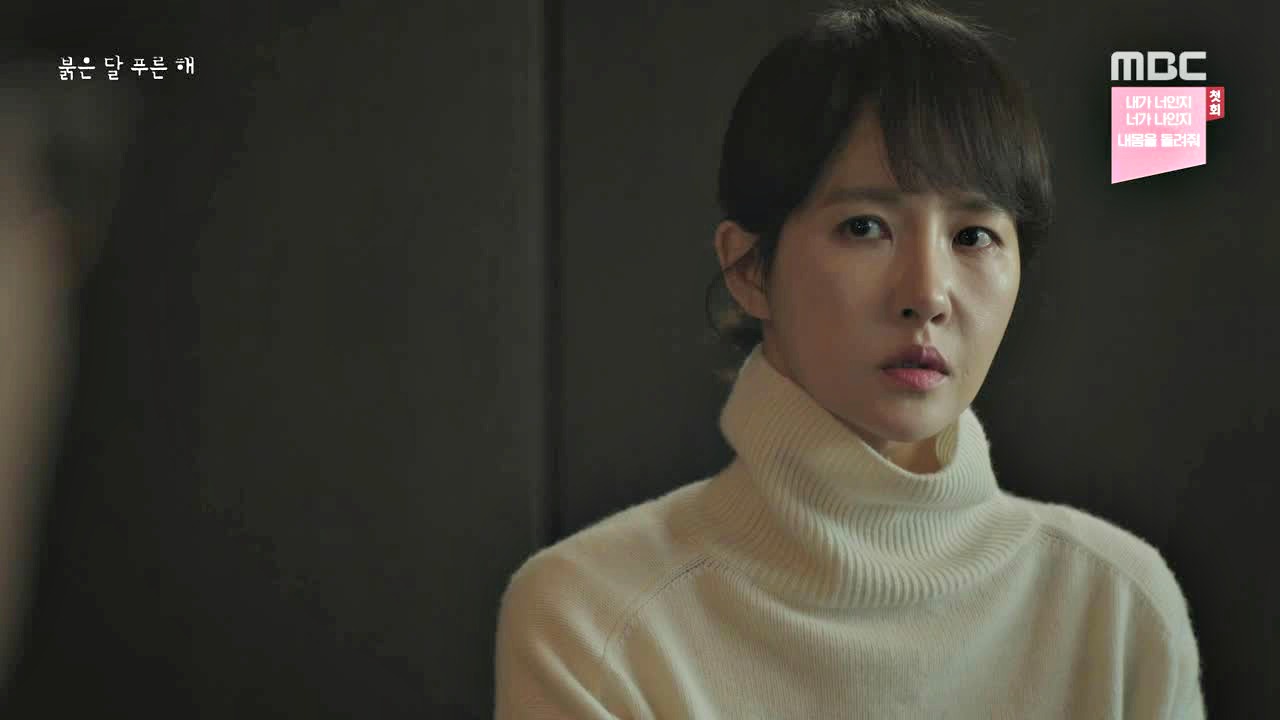
Dr. Yoon instead shifts the conversation, asking about Woo-kyung’s search for her sister. Woo-kyung vaguely says that she hasn’t come to any conclusions yet, but is shocked when Dr. Yoon says the exact same thing as Red Cry when he tells her to find her sister’s body, since that will be the only way to make her stepmother tell the truth.
Even though she’s refused to believe that Dr. Yoon could be Red Cry, Woo-kyung starts to doubt and asks him point-blank if he’s Red Cry. Dr. Yoon plays dumb, insisting he’s only speaking the obvious — her stepmother has lied to her all her life, so Woo-kyung now needs to go to extremes to find out the truth.
When Woo-kyung arrives at her stepmother’s home, however, she discovers Mom has fainted. Woo-kyung rushes Mom to the hospital, where the doctors tell her that Mom’s condition is getting worse and she may not have much longer to live.
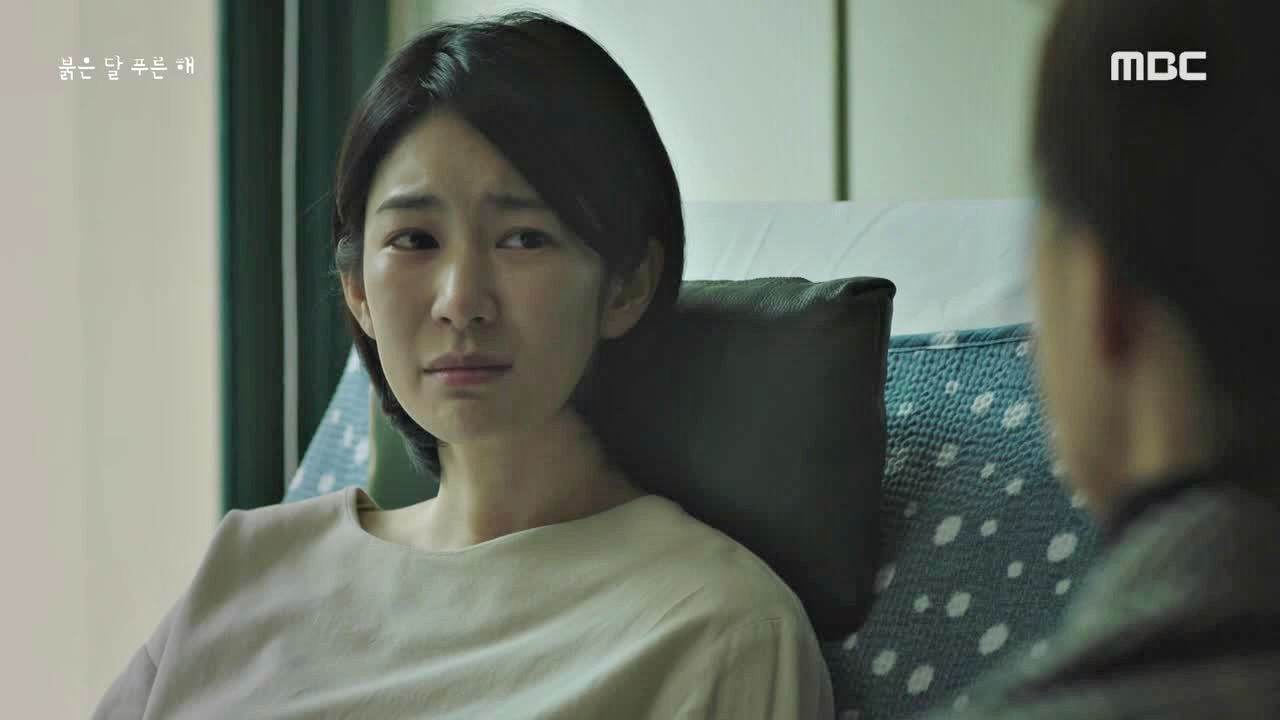
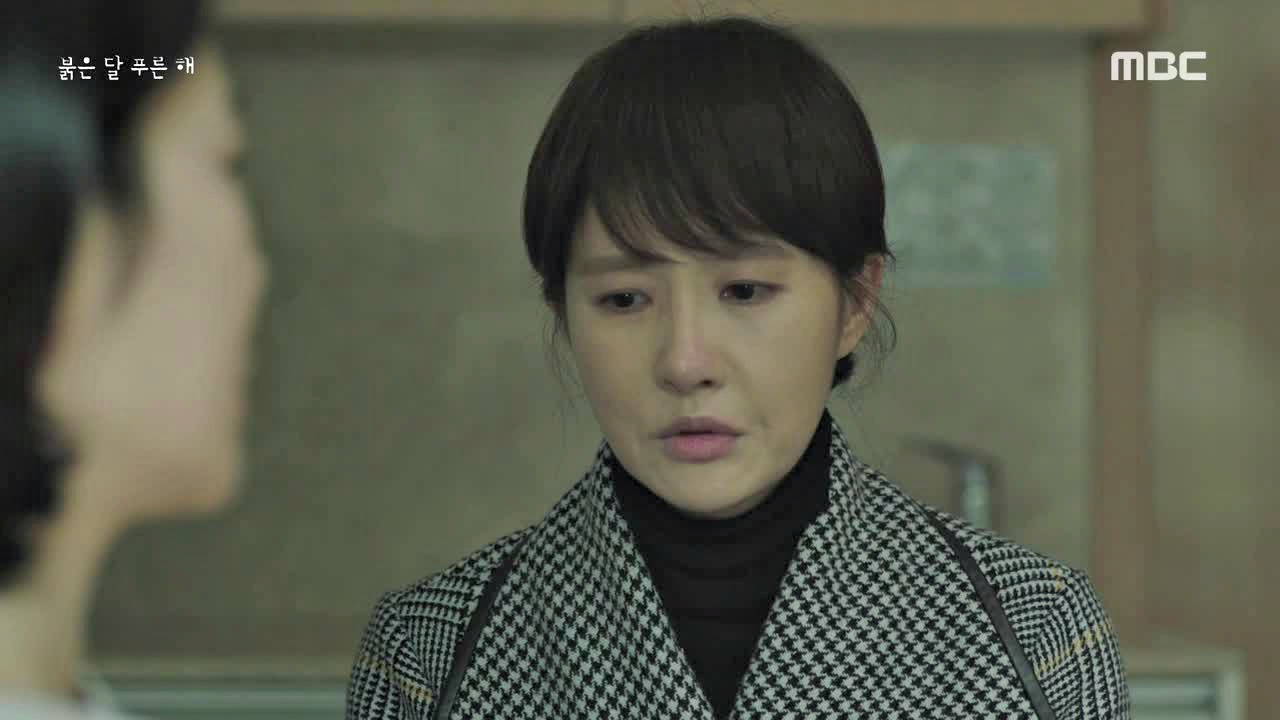
Woo-kyung goes to Se-kyung, telling her the truth: Se-kyung is actually the birth daughter of the woman they’ve always thought to be their stepmother. Se-kyung is shocked and furious, unable to believe that the woman who treated her so coldly all her life is her mother by blood.
Feeling betrayed, Se-kyung angrily decides she doesn’t want to go through with the stem cell treatment. But Woo-kyung pleads with her — they need to save Mom’s life so that they can find out the truth about the real Se-kyung. They can’t let Mom go to her grave with such an important secret.
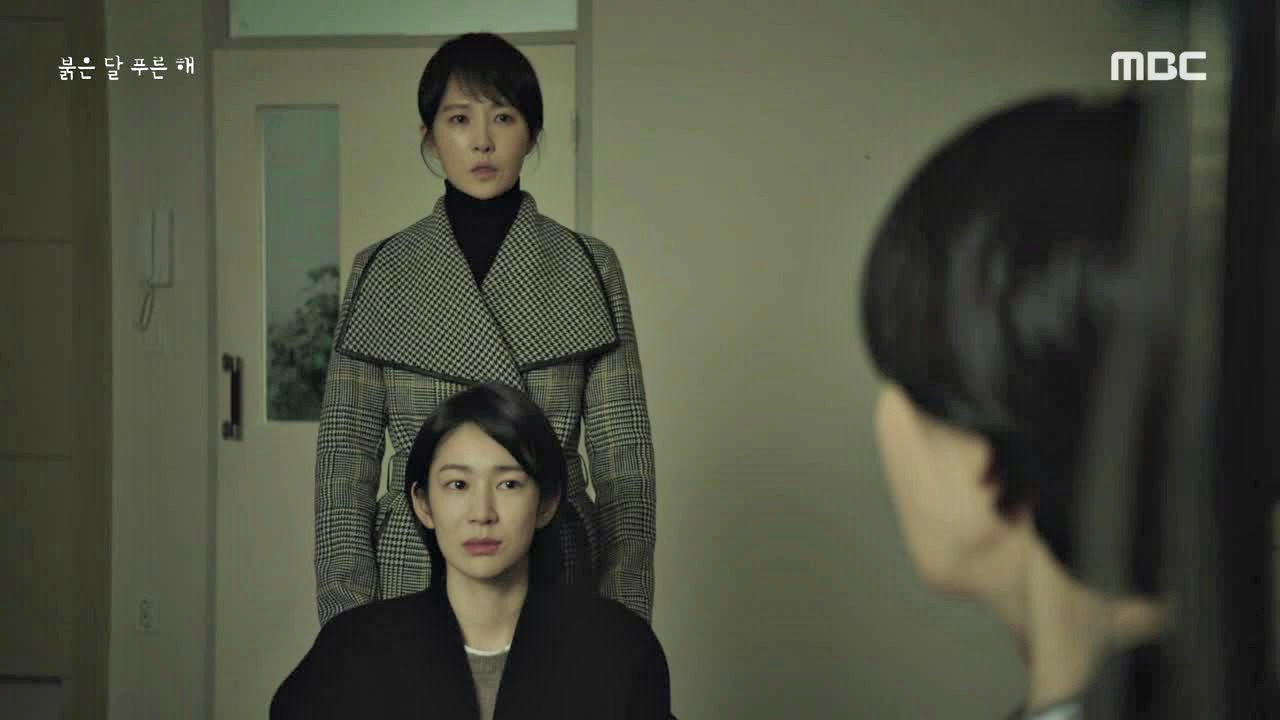
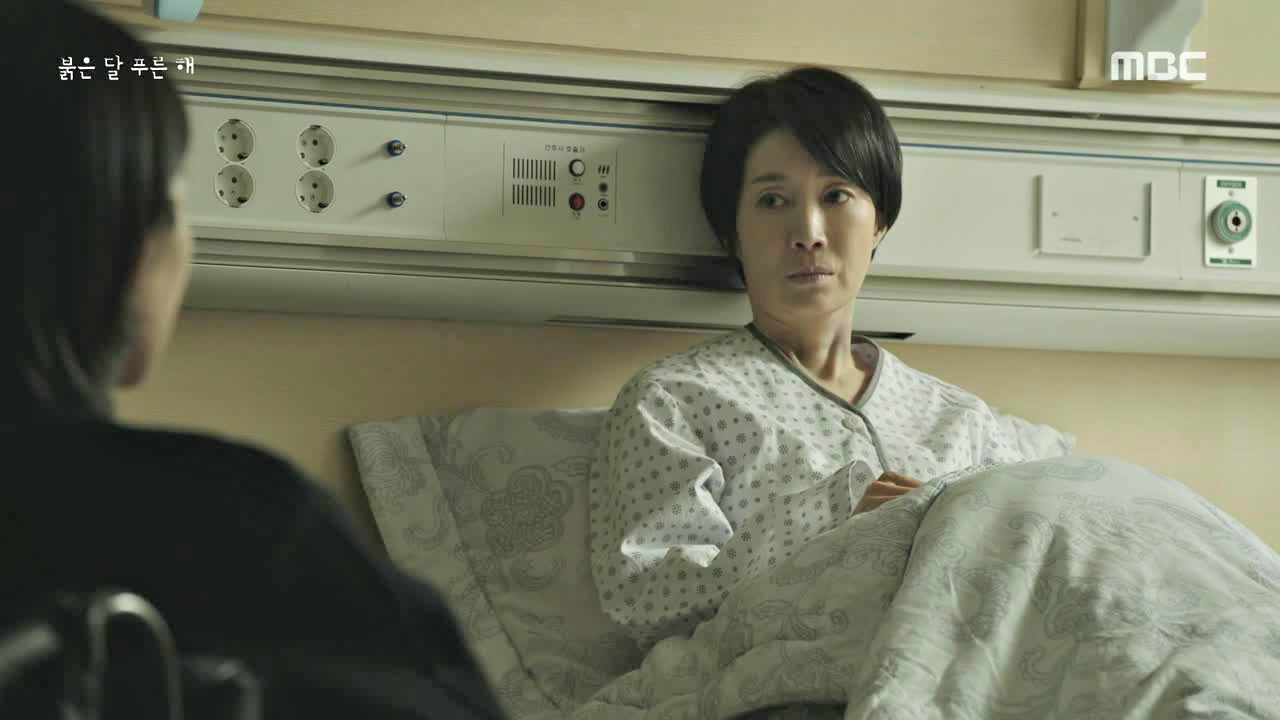
Woo-kyung takes Se-kyung to Mom’s hospital room, but Mom can’t seem to look at her child. Se-kyung realizes that when she lived with her grandmother, she thought that her grandmother called her “Song-yi” as a nickname, but now she knows that’s her real name. Se-kyung asks why Mom is so determined to die, and Mom wearily says that it’s penance for her sins.
With tears in her eyes, Se-kyung relents and decides that she’ll go through with the stem cell treatment. She needs Mom to live so that her mother — not her stepmother, but her mother — can finally care for her daughter the way that Se-kyung (or, rather, Song-yi) should have been cared for all her life.
Meanwhile, Woo-kyung’s still in communication with Red Cry, who suggests that if her stepmother won’t reveal the truth, then Woo-kyung should do some research and figure out where a child’s body could be hidden.
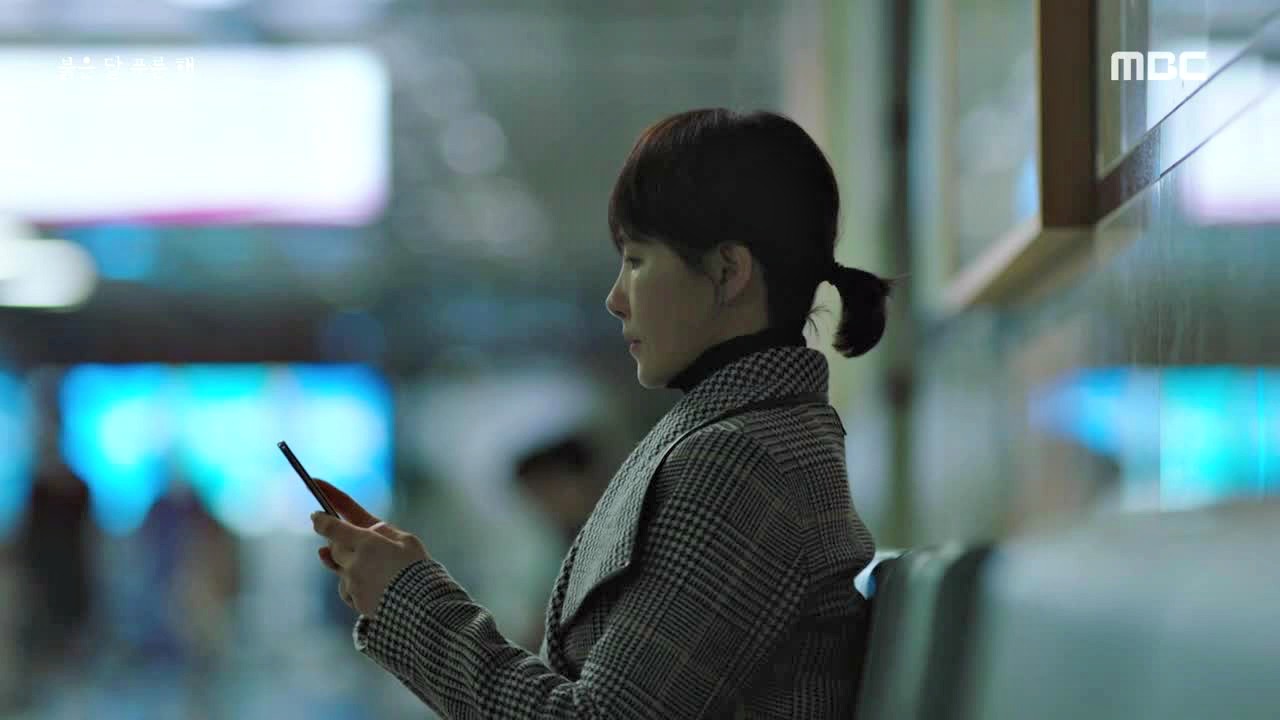
Woo-kyung’s first step is to pick Ji-heon’s brain, since she assumes a detective would know where people would hide dead bodies. He’s curious why she’s asking him, but she doesn’t elaborate. However, he’s been keeping a worried and watchful eye on Woo-kyung, and intuits that she’s searching for her dead sister.
He asks what she’ll do when she finds the body — will she judge her stepmother? Woo-kyung denies everything, but Ji-heon warns her that just like Red Cry focused on Shi-wan, so will Red Cry focus on her. Woo-kyung simply says that she just wants the truth.
Ji-heon cautions her that she hasn’t been fully tested by Red Cry yet, and eventually Red Cry will drag her over to the dark side. When that happens, he asks that Woo-kyung call him first.
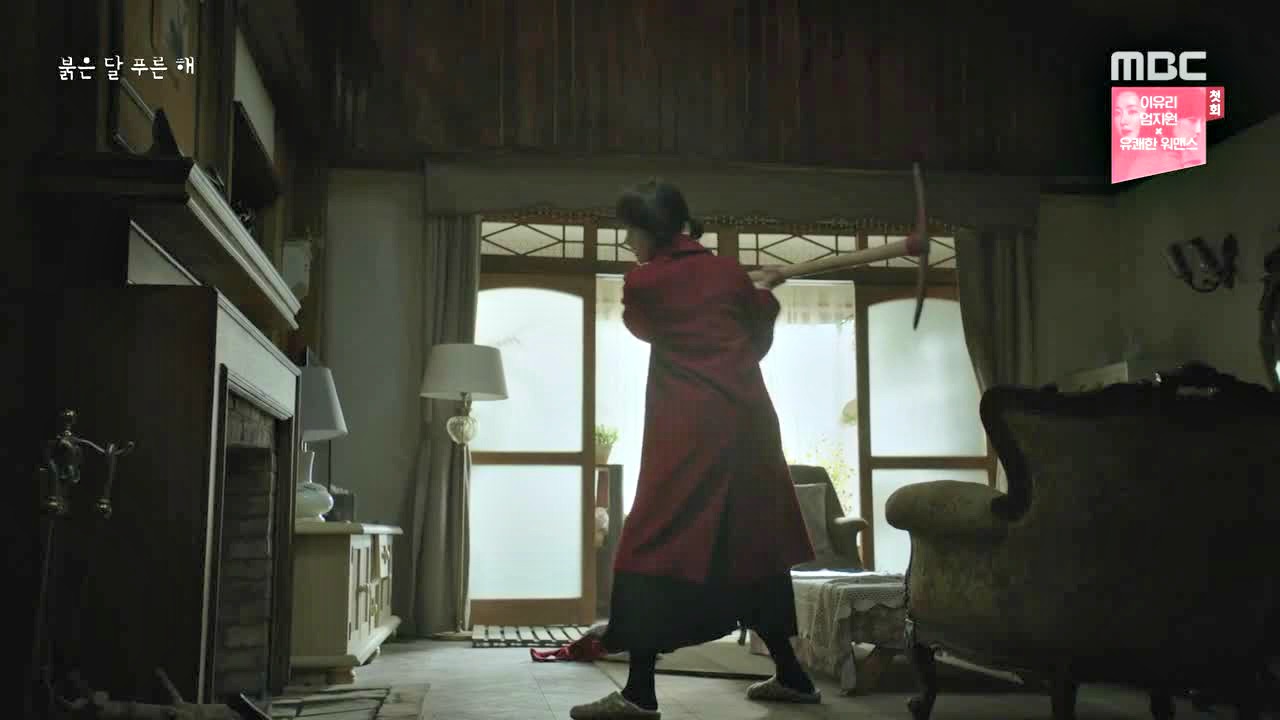
While Mom and Se-kyung/Song-yi go through the stem cell treatment, Woo-kyung returns to her stepmother’s home — her childhood home. Thanks to Ji-heon’s expert advice that killers generally keep a body nearby so they can make sure nothing happens to it, she tries to figure out where Se-kyung’s body might be.
Using an original blueprint of the house to compare to the current size of the rooms, Woo-kyung realizes that the fireplace was not a part of the original plan.
The fireplace definitely has been a source of creepy contention for Se-kyung/Song-yi and Mom, so Woo-kyung grabs a crowbar and pickaxe, and begins to whack away at it. Beneath the stone floor, she unearths something in a thick cloth bag — peeking out of the bag is a scrap of green fabric. It’s the green dress.
Watch the video
Finding hell under the fireplace
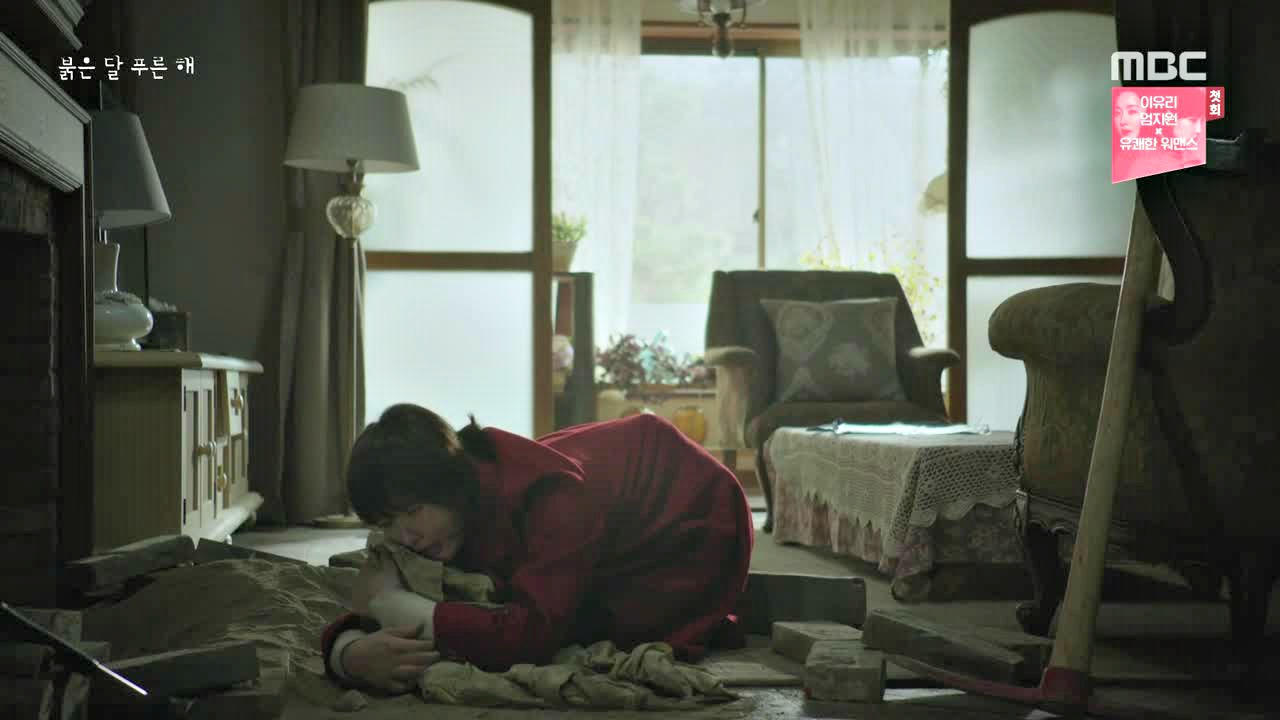
This is the point of no return that Eun-ho had warned her about, when she would find out the truth and all hell would break loose, just like it did for him. Pulling out the bag of her long-dead sister’s remains, Woo-kyung collapses in heart-wrenching sobs. She hugs the dirty cloth to her chest as she weeps over the realization that she’s finally found Se-kyung.
Mom wakes up in the hospital, where she’s still going through the stem cell treatment. But she’s shocked to see a weary and dirty Woo-kyung staring down at her. Woo-kyung drags Mom out of the hospital and back home, showing her the child skeleton and dress that’s been unearthed.

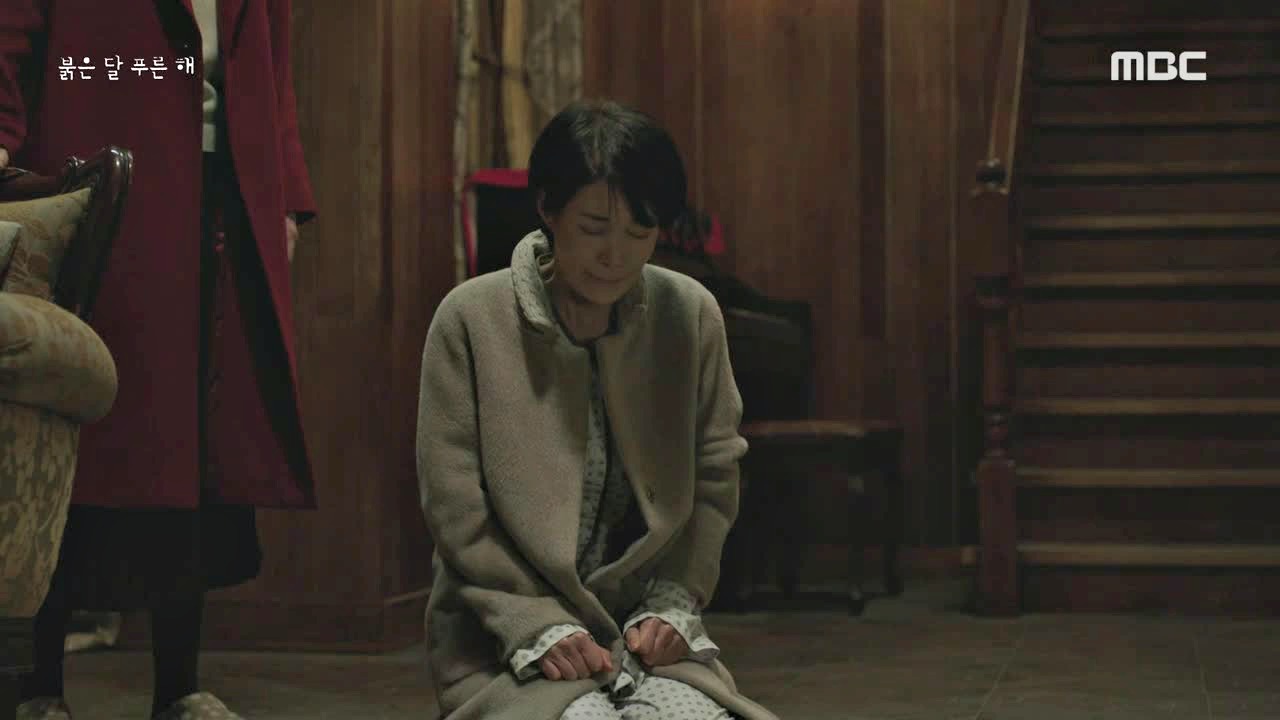
As Mom kneels in grief, Woo-kyung demands to know why her stepmother lied. Woo-kyung can’t believe that her parents happily lived their life in this house for the past thirty years, eating and drinking and laughing and watching TV in a room that contained the body of their dead child.
Mom finally confesses that, on the day she got angry at Se-kyung for being noisy and ripped the green dress, Se-kyung was actually fine after her bath. But Se-kyung died in her sleep that night, which is why young Woo-kyung couldn’t wake her up. There were bruises on Se-kyung, though, from the abuse she endured whenever Mom dragged her to the bathtub.
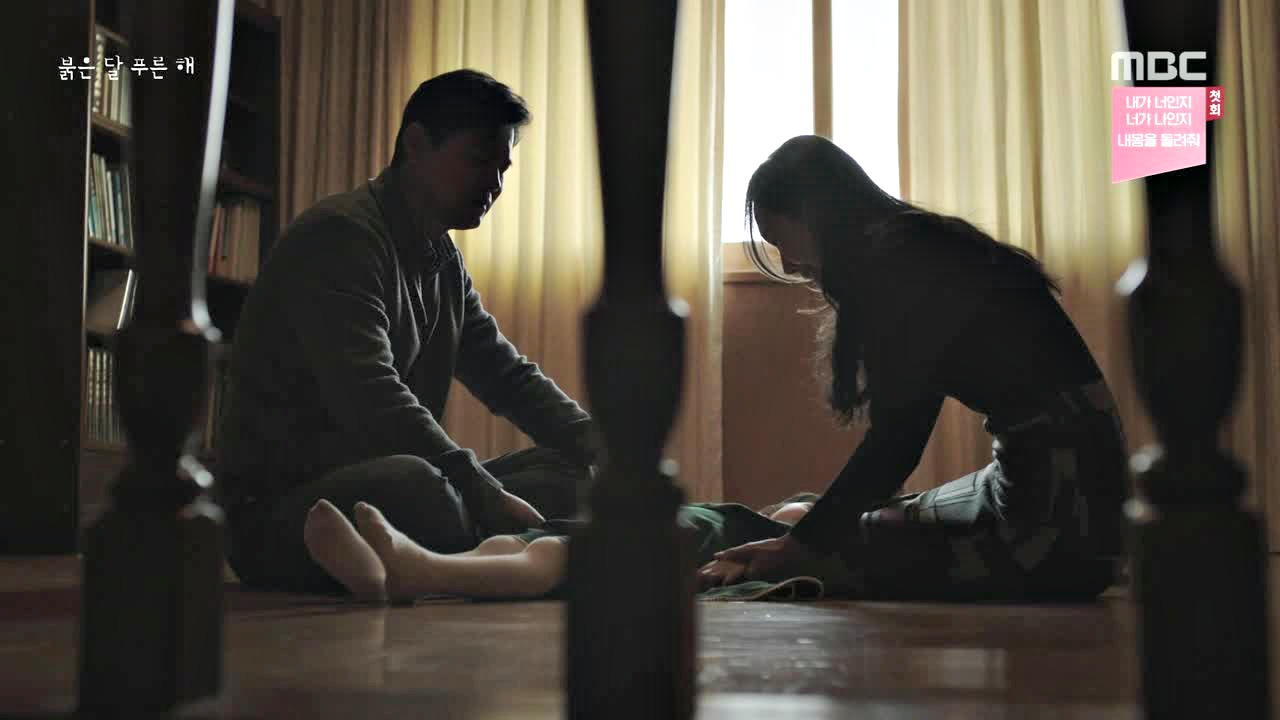
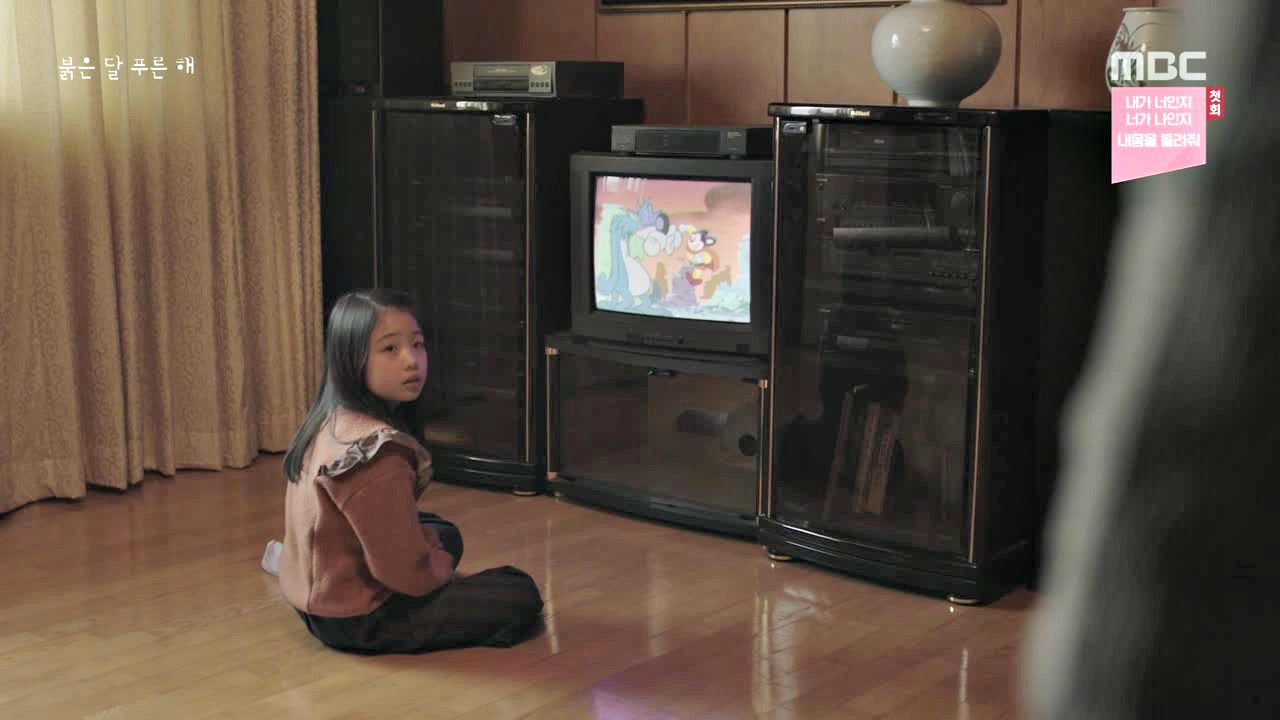
When Mom and Woo-kyung’s father were trying to figure out what to tell Woo-kyung, they realized that Woo-kyung was happily watching TV, having apparently lost her memory, likely due to the shock of finding her sister dead. That’s when they decided to quietly bury Se-kyung and convince Woo-kyung that Song-yi was really her sister.
It’s hard to know if anything Mom says is true, but Mom insists that she didn’t know that scolding Se-kyung for being dirty would end in such a way. Mom tearfully says she’s suffered, too, all these years having to raise Woo-kyung and her daughter as the fake Se-kyung.
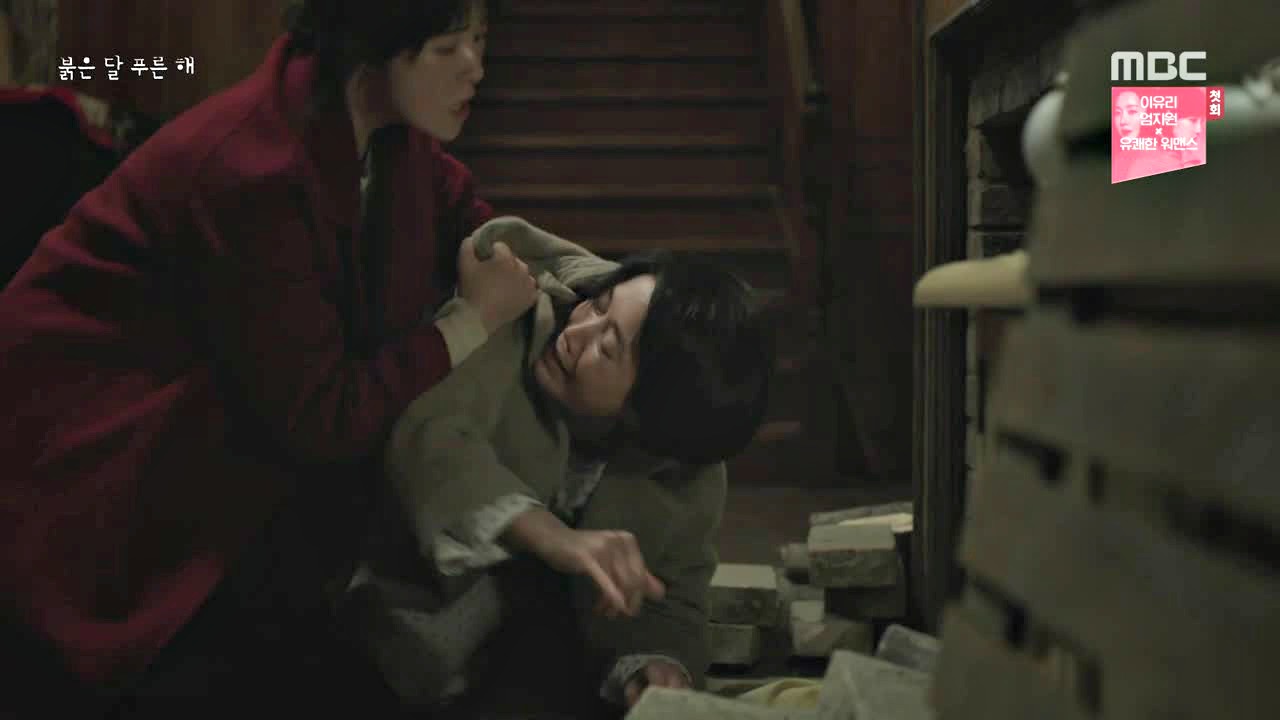
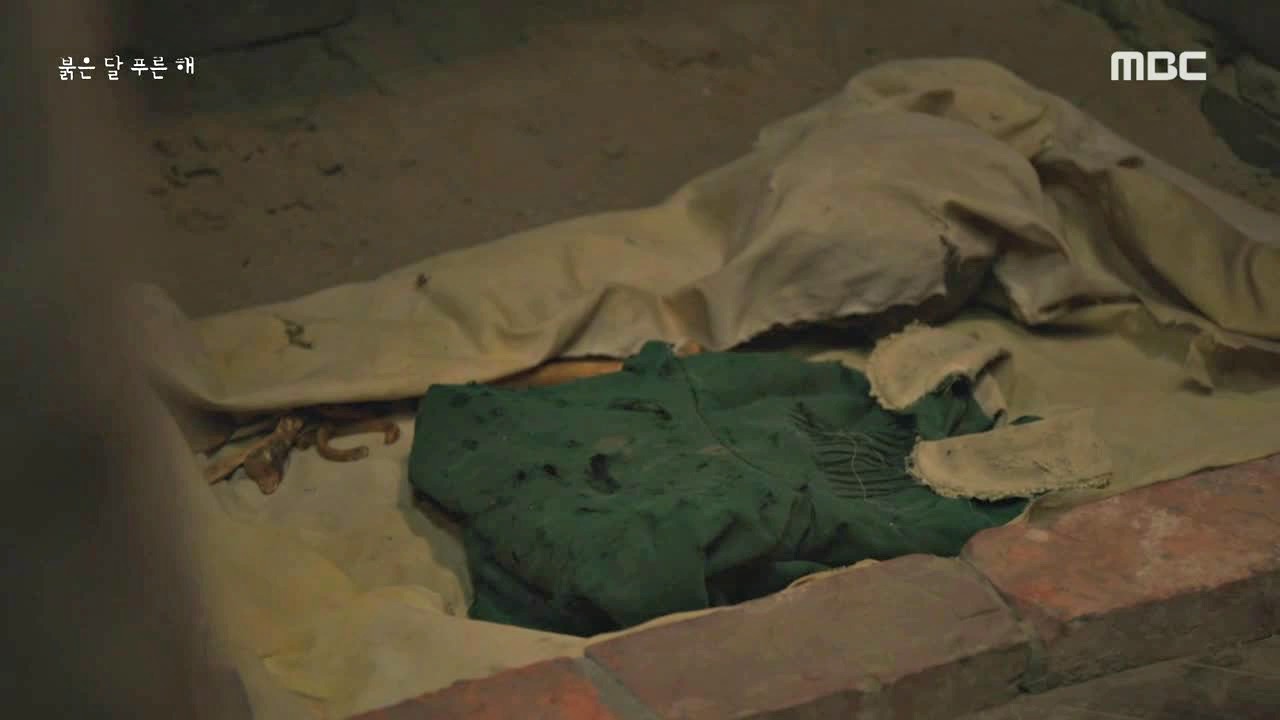
Furious, Woo-kyung shakes Mom and makes her look at Se-kyung’s remains, asking how this could have happened to a mere child. Mom retorts that it’s more painful to live than to die. Besides, it’s not like she killed Se-kyung on purpose — it was an accident!
Woo-kyung’s rage continues to boil over as she screams that her stepmother has no right to be called a mother. Much like the night she grabbed the knife after her fight with her husband, Woo-kyung’s fury compels her to reach for a hammer and raise it threateningly over her cowering stepmother.
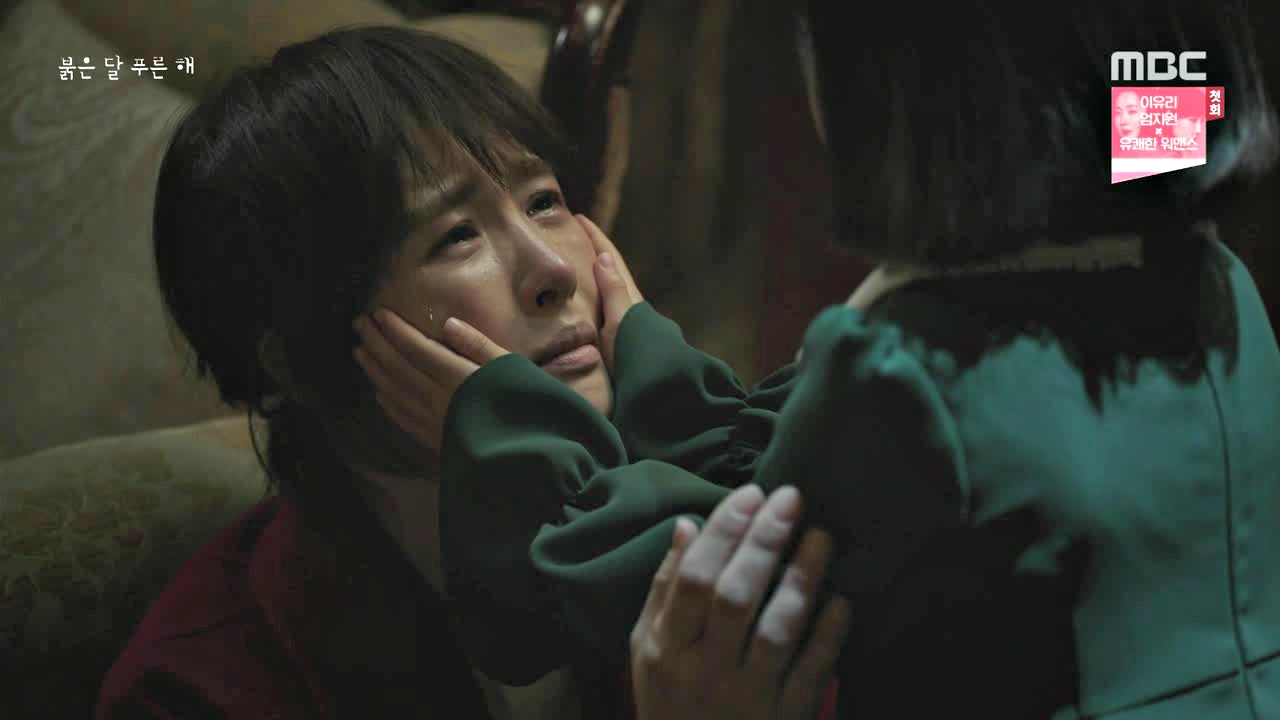
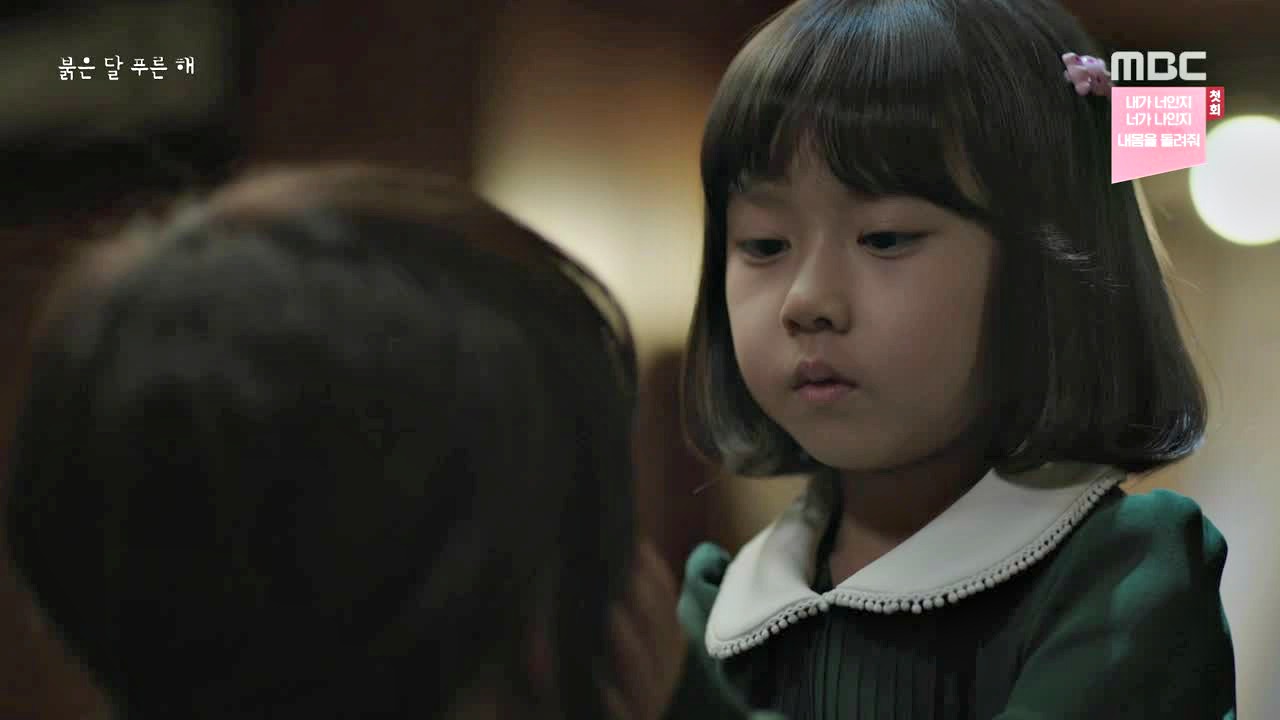
But a small hand stops her — it’s the little girl in the green dress. This time, instead of wondering who the little girl is, Woo-kyung starts to sob as child Se-kyung gently holds Woo-kyung’s face. Woo-kyung’s rage dissipates as she weeps, tightly hugging her sister.
Of course, the little girl in the green dress — Se-kyung — is only a hallucination. But Woo-kyung’s rage is contained nonetheless, and she stares at her sister’s remains in the fireplace, apologizing for everything that happened.
Woo-kyung then calls Ji-heon, letting him know she’s found her sister. Ji-heon and the other detectives immediately race over and turn Woo-kyung’s childhood home into a crime scene as they gather evidence. Soo-kyung takes Mom back to the hospital, and Ji-heon stays with Woo-kyung, who’s still in a state of shock.
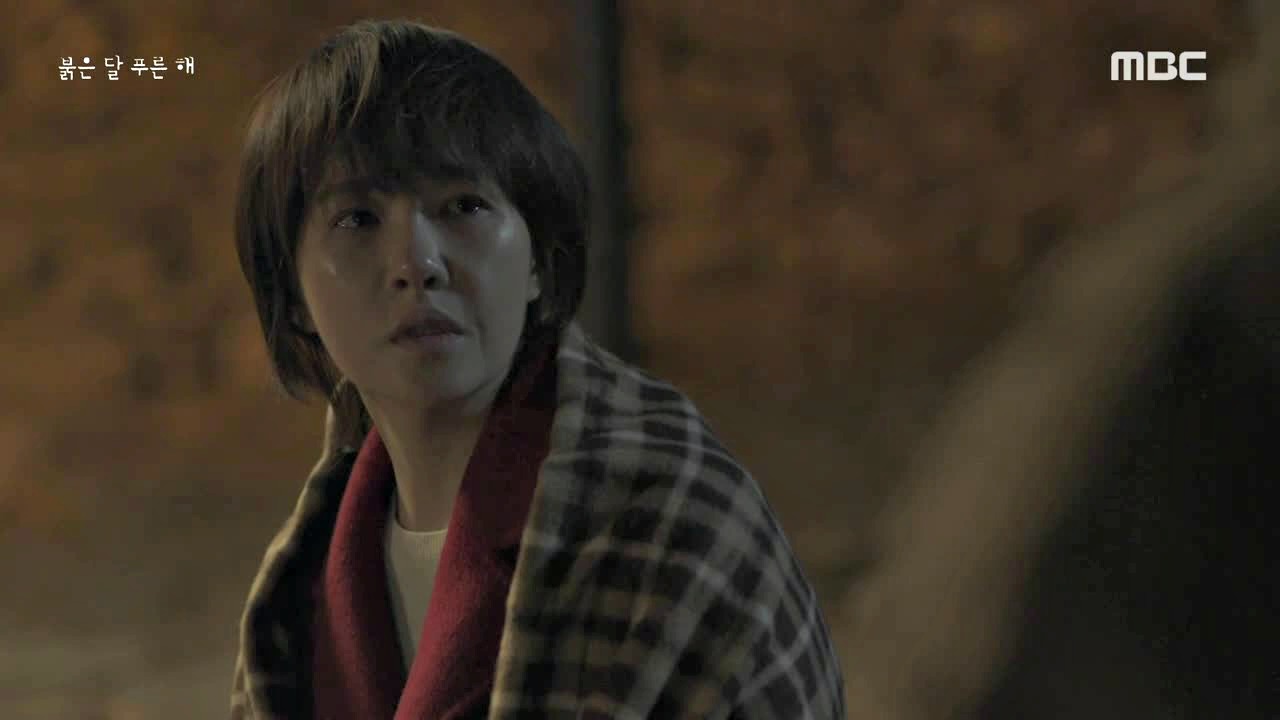
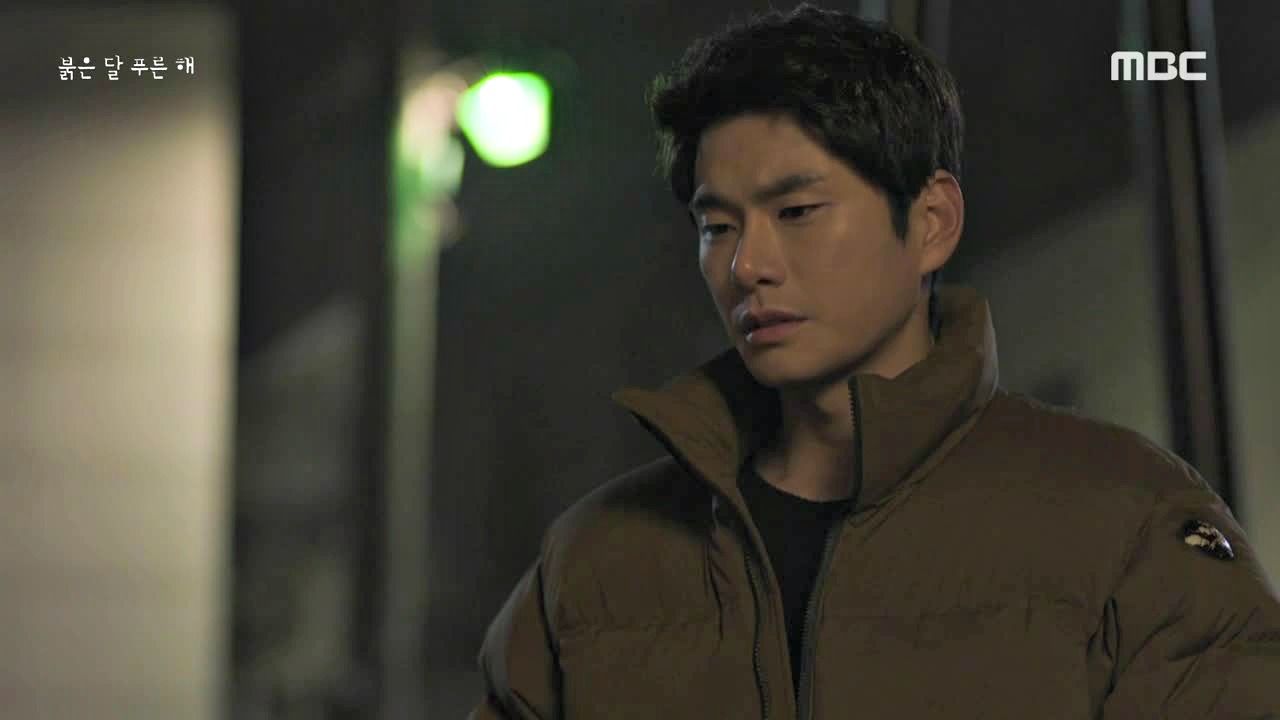
He reassures Woo-kyung that Se-kyung’s remains will be confirmed via DNA testing, and admits that the reason he’d asked Woo-kyung to call if she felt like she was going over the edge was so that she didn’t up like Eun-ho. Woo-kyung begins to cry again as she realizes that Se-kyung was the one who stopped her murderous rage, and is the only reason she didn’t seek the same kind of vengeance Eun-ho did.
As the case is investigated, Woo-kyung informs Red Cry that Mom can’t be prosecuted because the statute of limitations has expired. Red Cry asks if Woo-kyung forgives her stepmother, but Woo-kyung can still barely comprehend what’s happening.
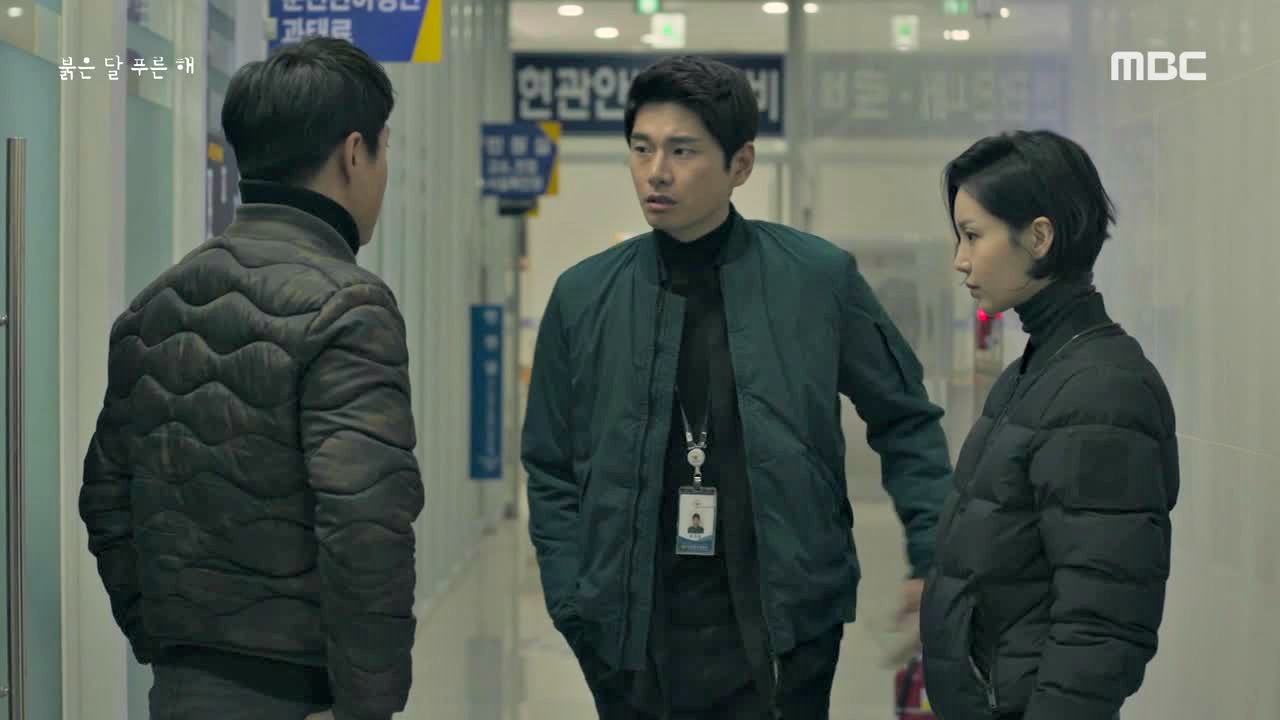
Ji-heon finds a senior officer rudely berating Soo-young, who meekly accepts the verbal abuse. Ji-heon steps in, defending his partner and warning the senior officer that if there’s a problem, then he’d better talk to Ji-heon first.
When they return to their office, Chan-wook is delighted to inform them that he’s figured out how Dr. Yoon managed to glean information that not even the children’s counselors or the detectives could discover. Dr. Yoon gives his patients a special hypnotic drug that lowers their defense mechanism. That then allows him access to their innermost secrets and memories, but without anyone being aware of his interference.
It sounds ridiculous, but whatever, we’ll roll with it, because now there’s no hiding the fact that Dr. Yoon is Red Cry. His face is clearly seen to us as he types his messages to Woo-kyung.
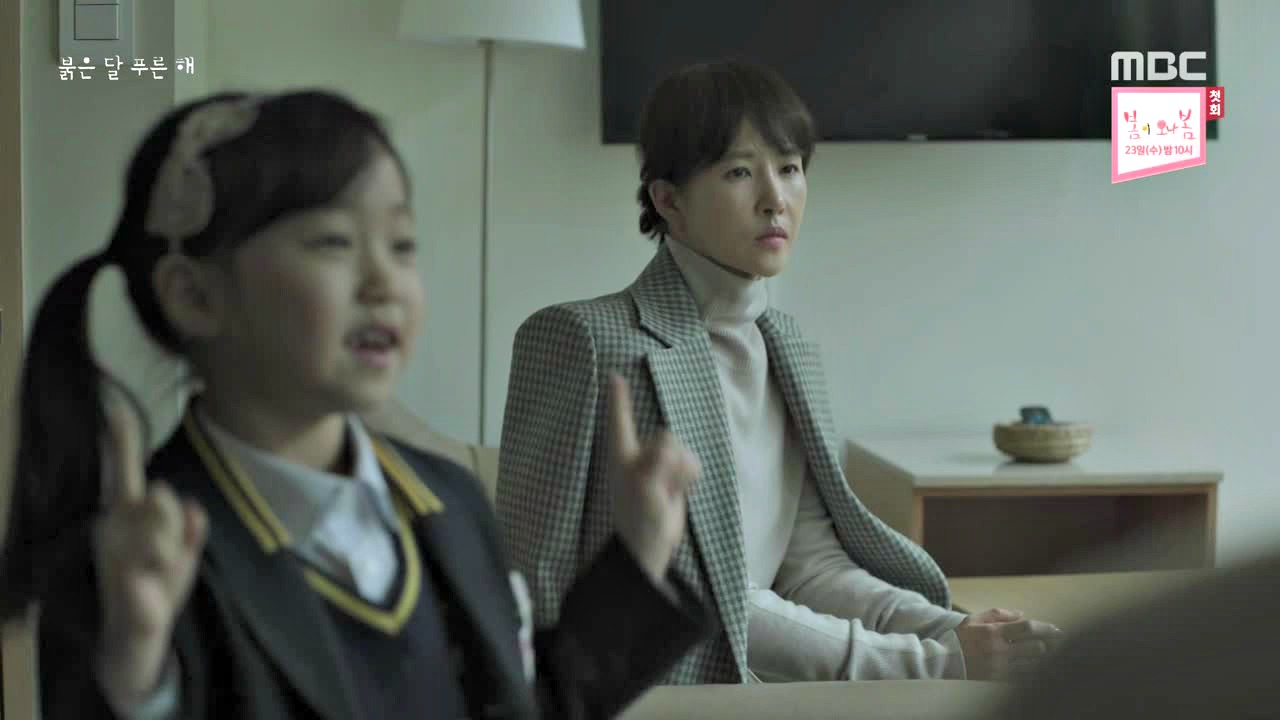
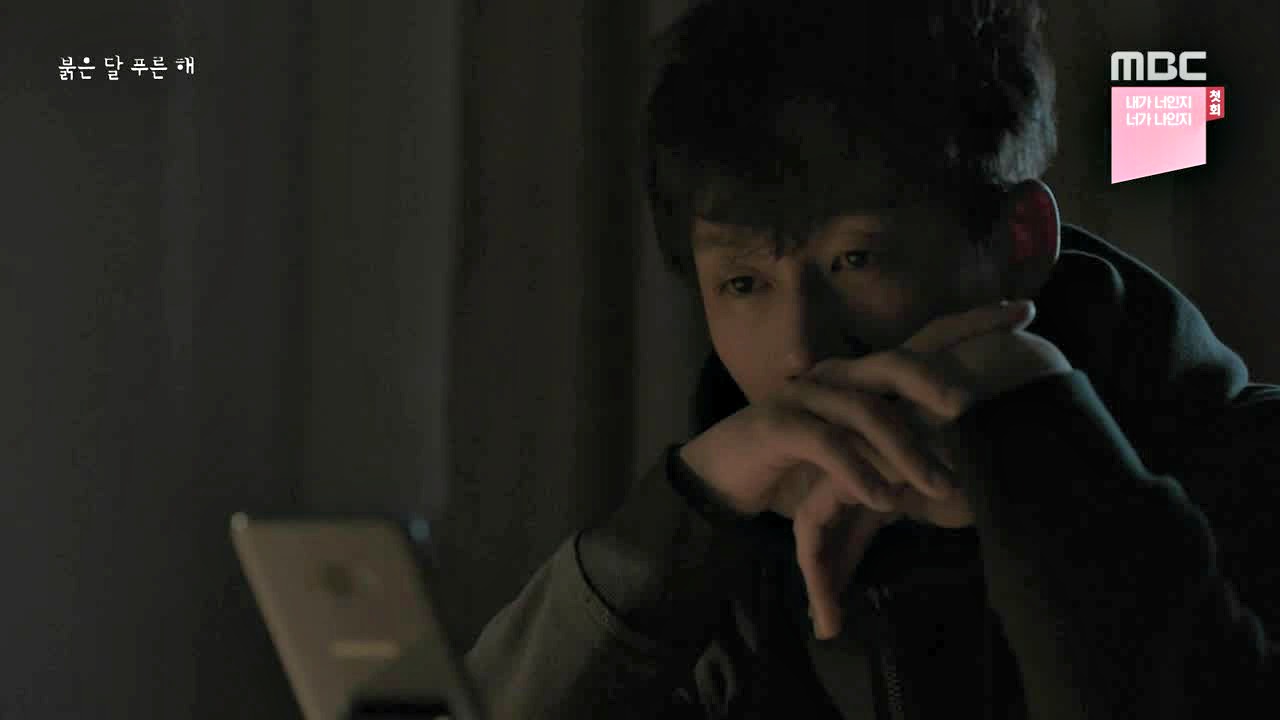
Woo-kyung dazedly goes through the motions of her life, finding it difficult to connect to anything, especially her stepmother. Red Cry/Dr. Yoon’s messages continue unabated as he reminds Woo-kyung that she saved her stepmother’s life, given her a new chance, even though Se-kyung’s life stopped at age five.
As she watches the adult Se-kyung/Song-yi and Mom grow closer, Woo-kyung ruminates over Red Cry/Dr. Yoon’s latest message, which asks if she can accept the fact that her stepmother is still alive.
At the police station, Ji-heon notes that Soo-young disappeared, and Chan-wook reveals it’s because she left with her stepbrother. Chan-wook’s looked into the guy’s records and discovered that the stepbrother has a gambling problem, which routinely gets him in trouble with the law. Ji-heon does a little investigating and realizes that Soo-young has been trying to cover up for her stepbrother’s crimes.
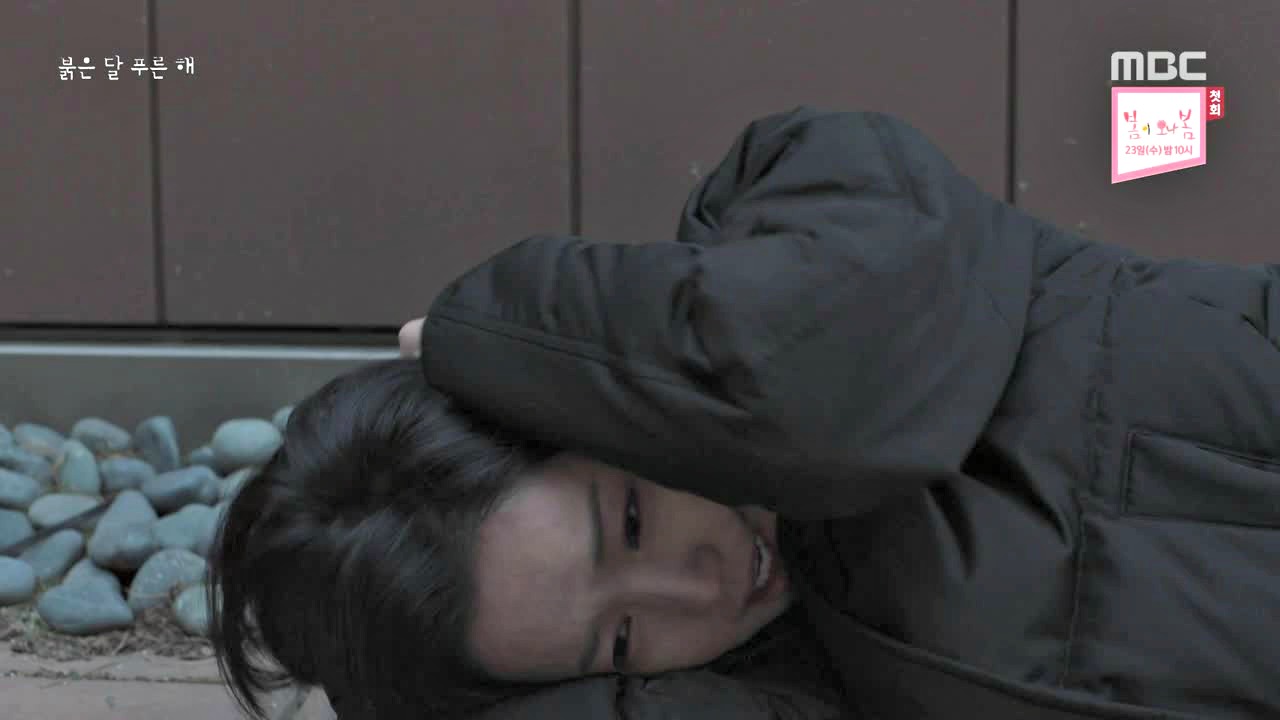
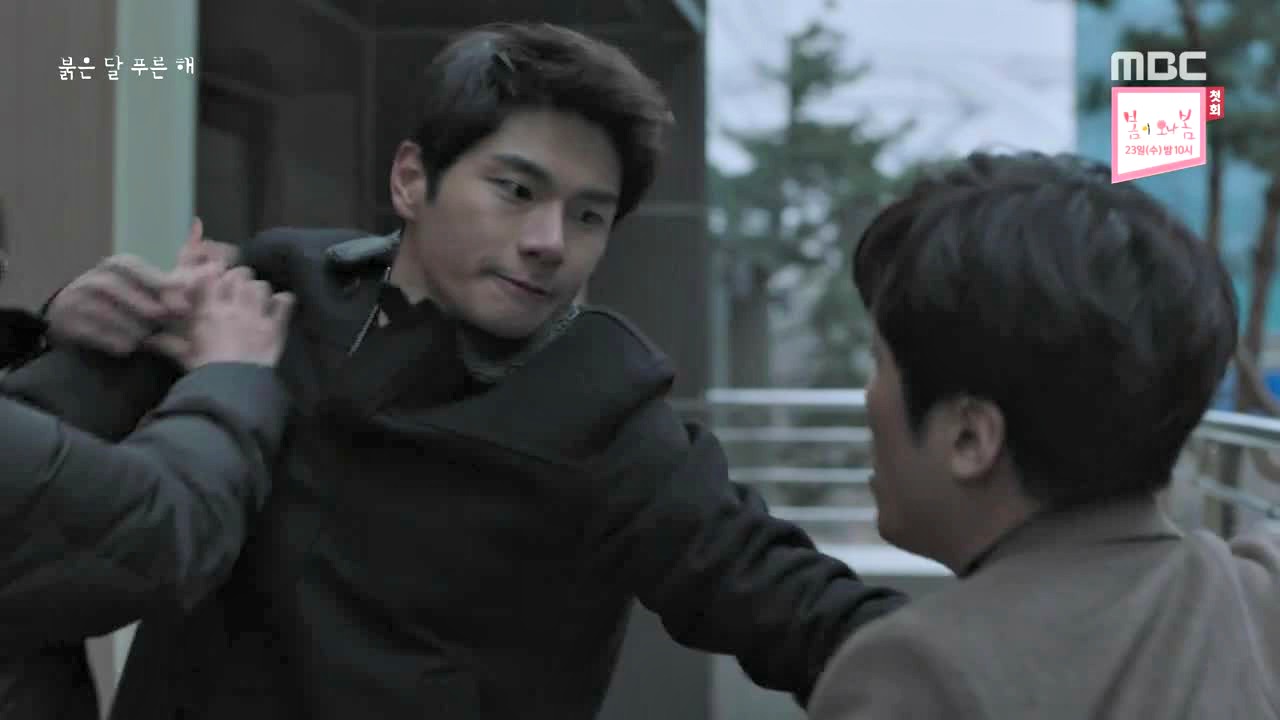
Ji-heon searches for her, and is shocked to find Soo-young curled up in a fetal position as her stepbrother ruthlessly kicks her. Ji-heon shoves the guy away, but her stepbrother fights back. Ji-heon’s no slouch when it comes to defending himself, and he pummels the stepbrother until Soo-young intervenes.
Later, Ji-heon asks her why she let her stepbrother beat her up, and Soo-young says that it’s because she wouldn’t steal evidence for him. Ji-heon, knowing full well that Soo-young is more than capable of fighting her own battles, finds it hard to believe she’d just lie there and take the beating. Soo-young quietly confesses that, after her mother remarried, she learned as a young child to endure her stepbrother’s abuse in order to not be an annoyance for the newly combined family.

Ji-heon’s outraged on her behalf, and orders her not to meet her stepbrother alone again — she should take Ji-heon or Chan-wook along with her the next time she needs to see her stepbrother. Aw, Soo-young’s essentially just replaced her abusive stepbrother with two new and improved “brothers.”
Woo-kyung checks on her stepmother, asking if she’ll be okay without a caregiver for the weekend. Mom says that she’s ready to be on her own, anyway. Woo-kyung asks if Mom is really happy, but Mom simply says she’s just living. Before she bids her mother goodnight, Woo-kyung murmurs that Mom shouldn’t look so happy. That feels ominous.
Red Cry/Dr. Yoon sends Woo-kyung a message, confirming that she’s sure she wants to “go through with it.” Woo-kyung insists she won’t have any regrets. Then she asks him why he does all this in the first place. He says it’s the same reason that she does it — out of guilt and fury. Uh oh. This can’t be good.
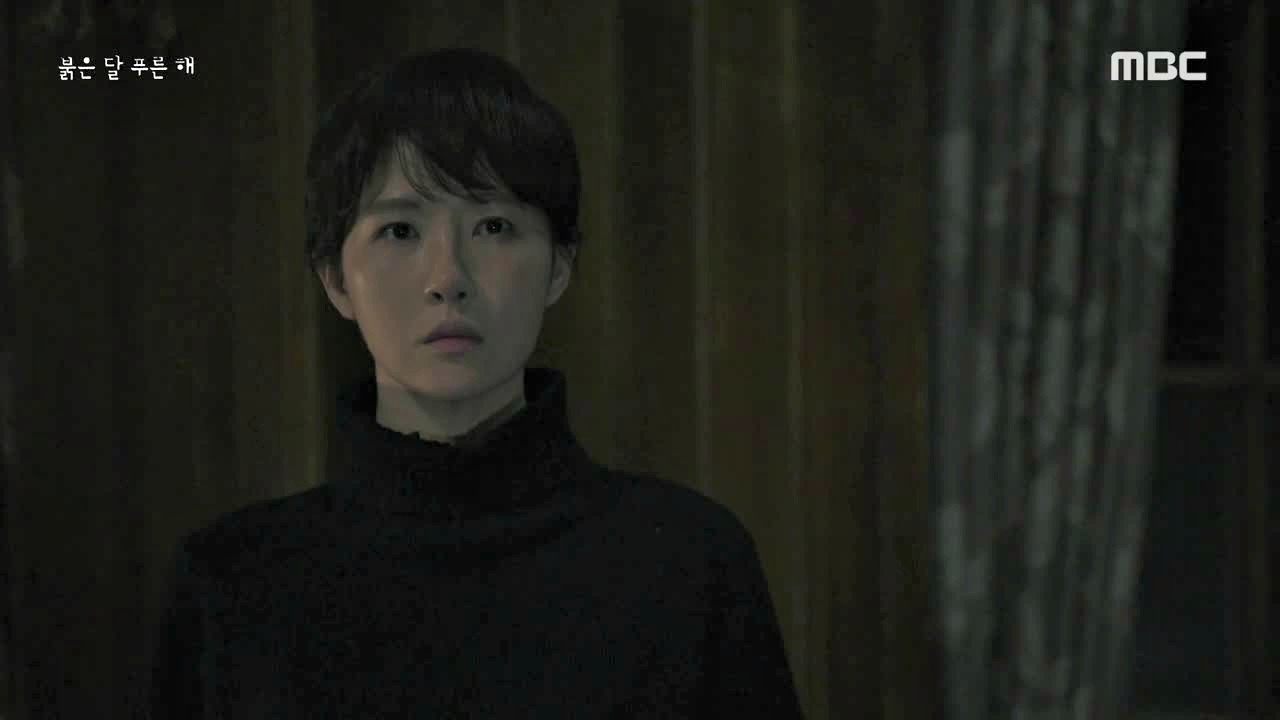
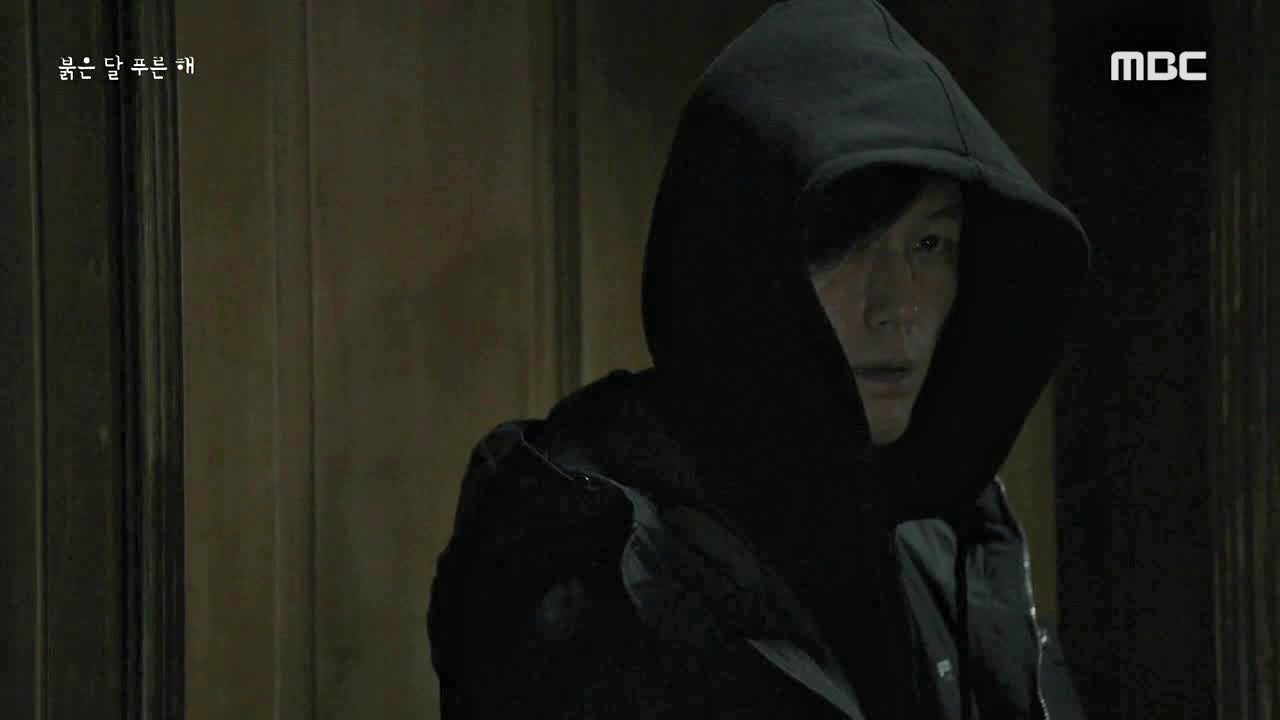
That night, Dr. Yoon, in the trademark Red Cry black hoodie, breaks into Mom’s house and immediately heads to her bedroom. But the moment his hand touches the door handle, Woo-kyung calls out his name. She’s been sitting in the living room, waiting for him.
Dr. Yoon asks if she’s changed her mind, but Woo-kyung says her mind has always been the same — she’s always chosen life (and the opportunity it brings). Yes, she’s still furious with her stepmother, so much so that she could kill the woman herself. But who is she to judge and decide that someone’s life isn’t worth living?
Ji-heon and Soo-young run into the room, their guns at the ready. This was all a trap to catch Red Cry/Dr. Yoon.
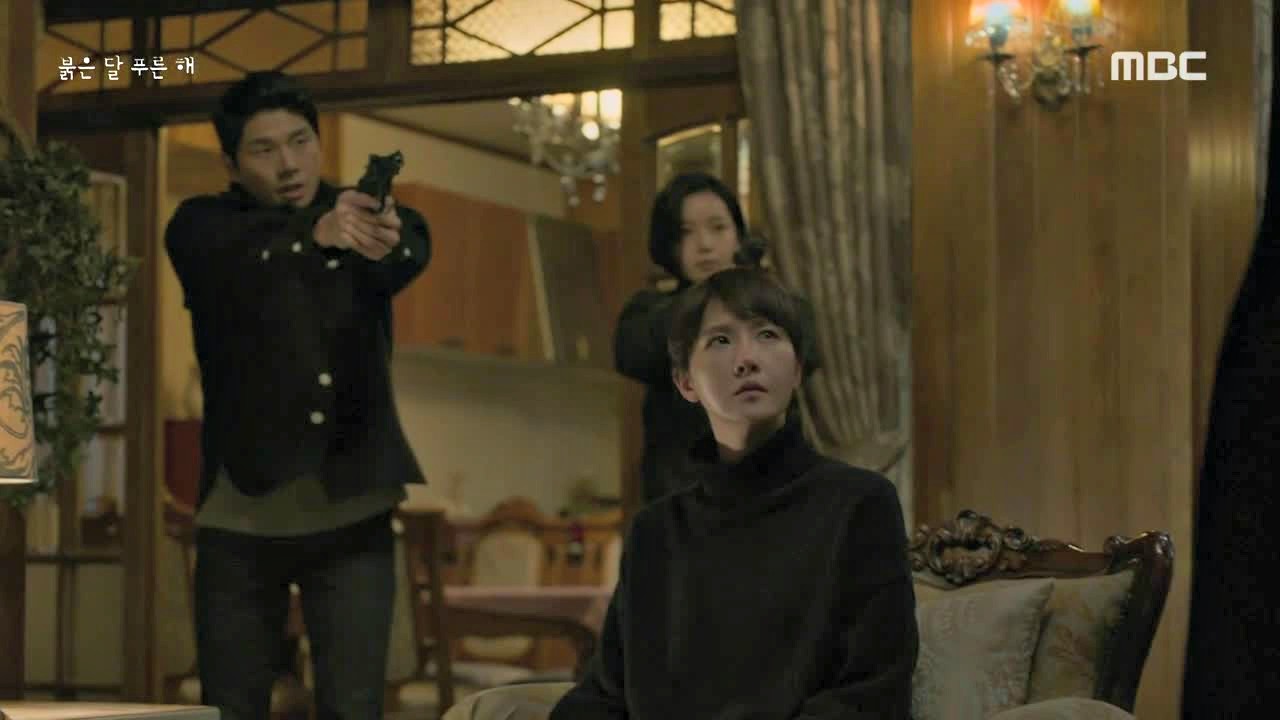
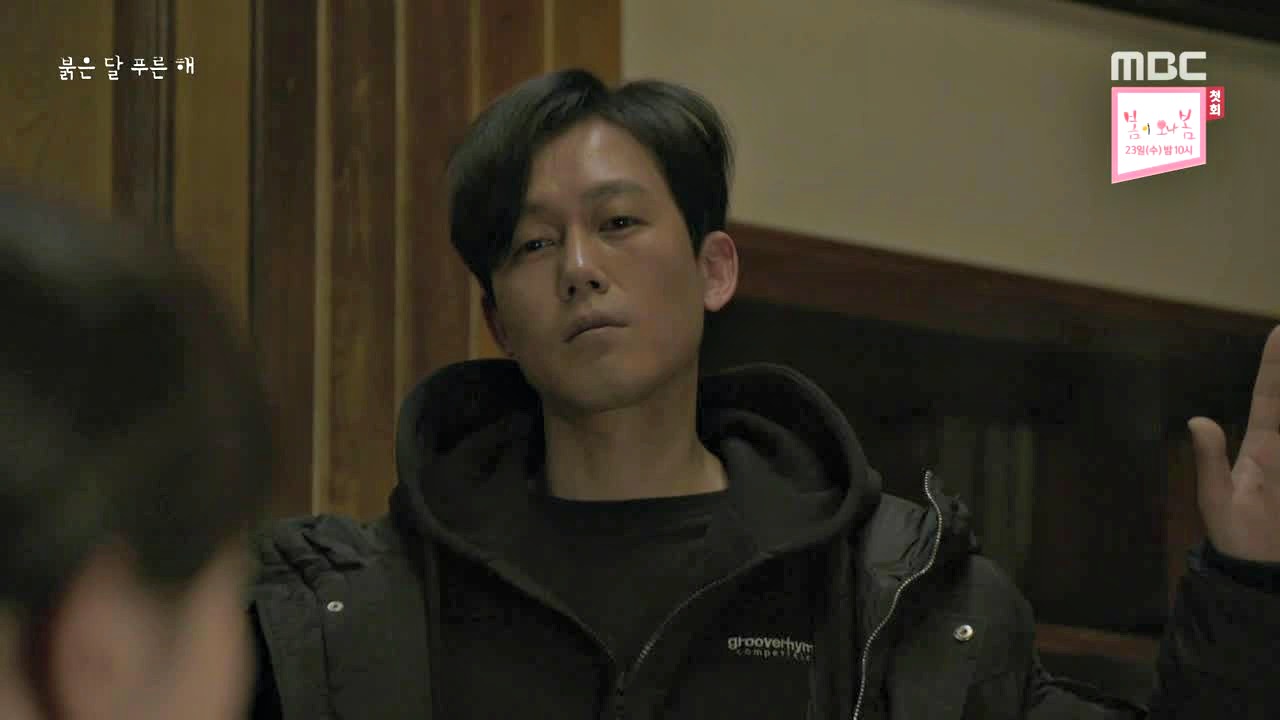
Dr. Yoon seems genuinely angry and surprised by Woo-kyung’s betrayal, but he finally throws his hands up in surrender.
Ji-heon can’t hide his gleeful satisfaction as he interrogates Dr. Yoon, who confesses that he did, indeed, kill Shi-wan’s father. Dr. Yoon also admits that he’s Red Cry.
Ji-heon knows that there’s no way Dr. Yoon and Eun-ho could have remained strangers during their work as Red Cry, and Dr. Yoon reveals that Eun-ho came to him for a consultation about his insomnia due to his nightmares about the big desk.
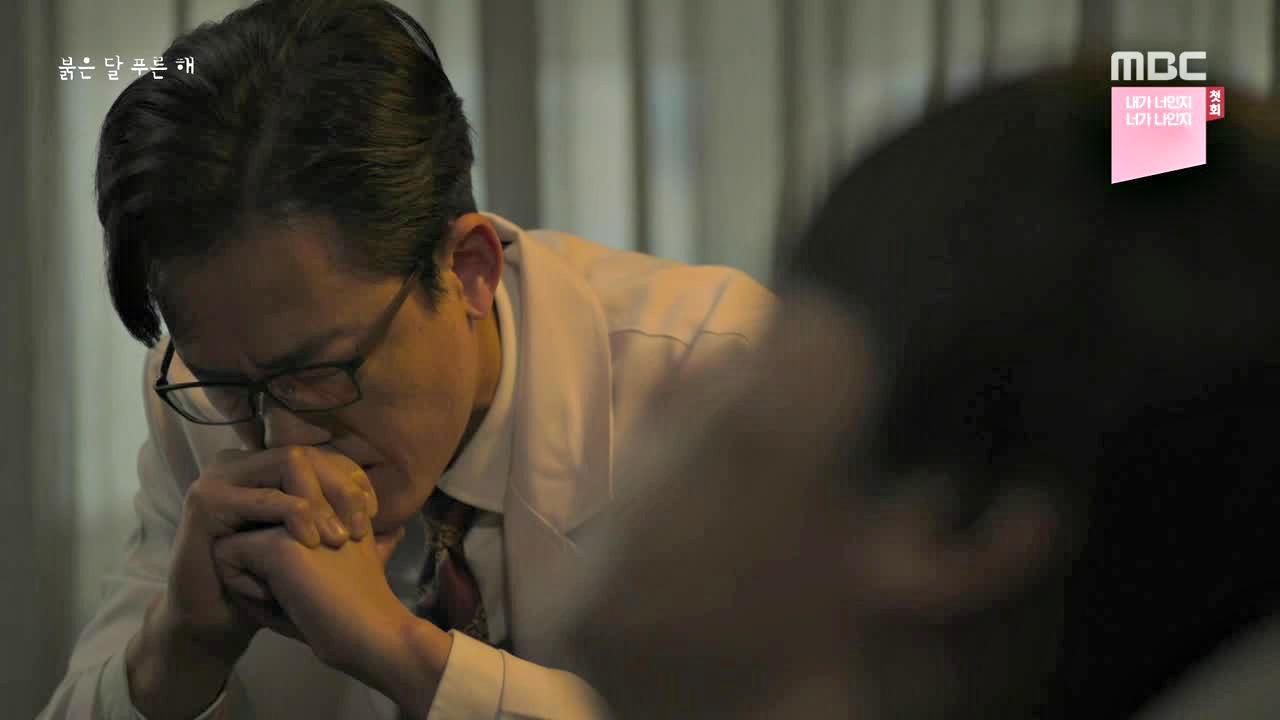
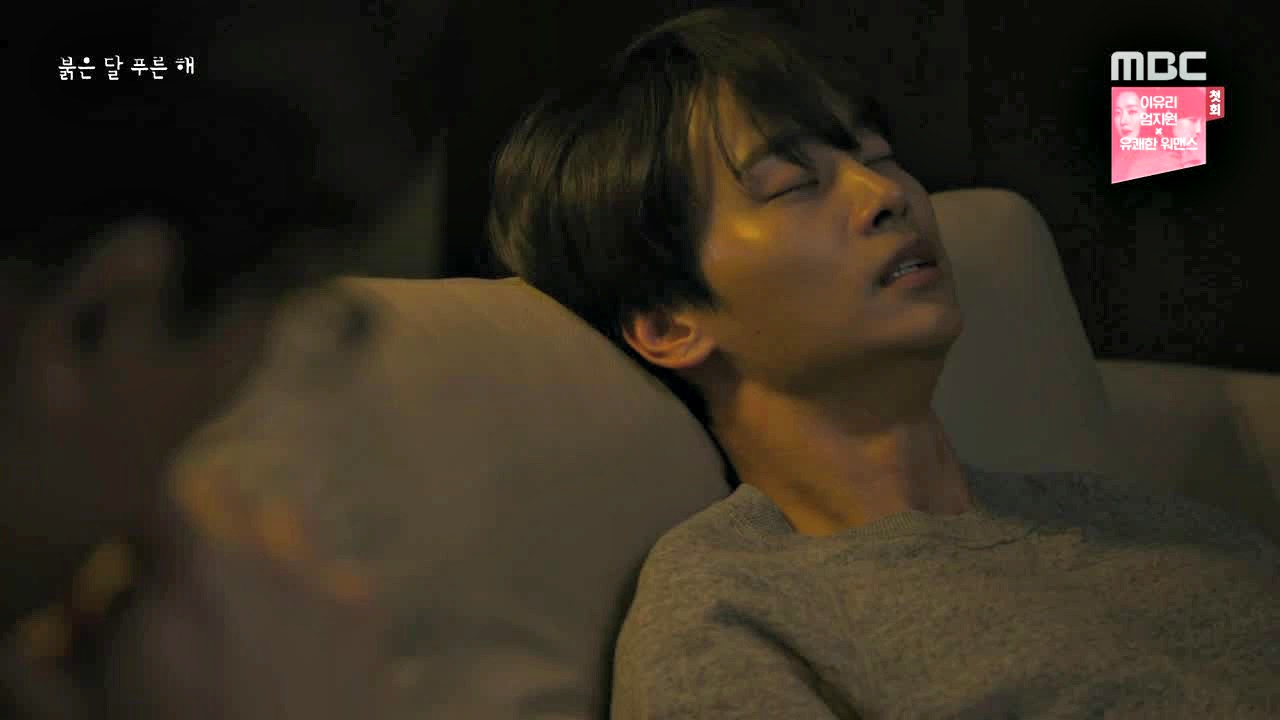
Dr. Yoon treated Eun-ho through hypnosis, and in doing so, he experienced Eun-ho’s memories of the abuse the younger man endured at the hand of the senior director. The anger the two men felt about that memory was the impetus for them creating Red Cry — which was created exactly as Eun-ho described, except Dr. Yoon was also a founding member.
Dr. Yoon did all the research, and Eun-ho was the one who fulfilled the punishment. Ji-heon wonders if Dr. Yoon became the punisher once Eun-ho died, but Dr. Yoon says that Shi-wan and Woo-kyung’s cases were ones he personally wanted to take care of.
Shi-wan and Woo-kyung’s grief over their inability to save their younger siblings, and their relief that they escaped the abuse their siblings endured, were exactly the same emotions Dr. Yoon felt once he realized what kind of life Eun-ho had experienced as a child.
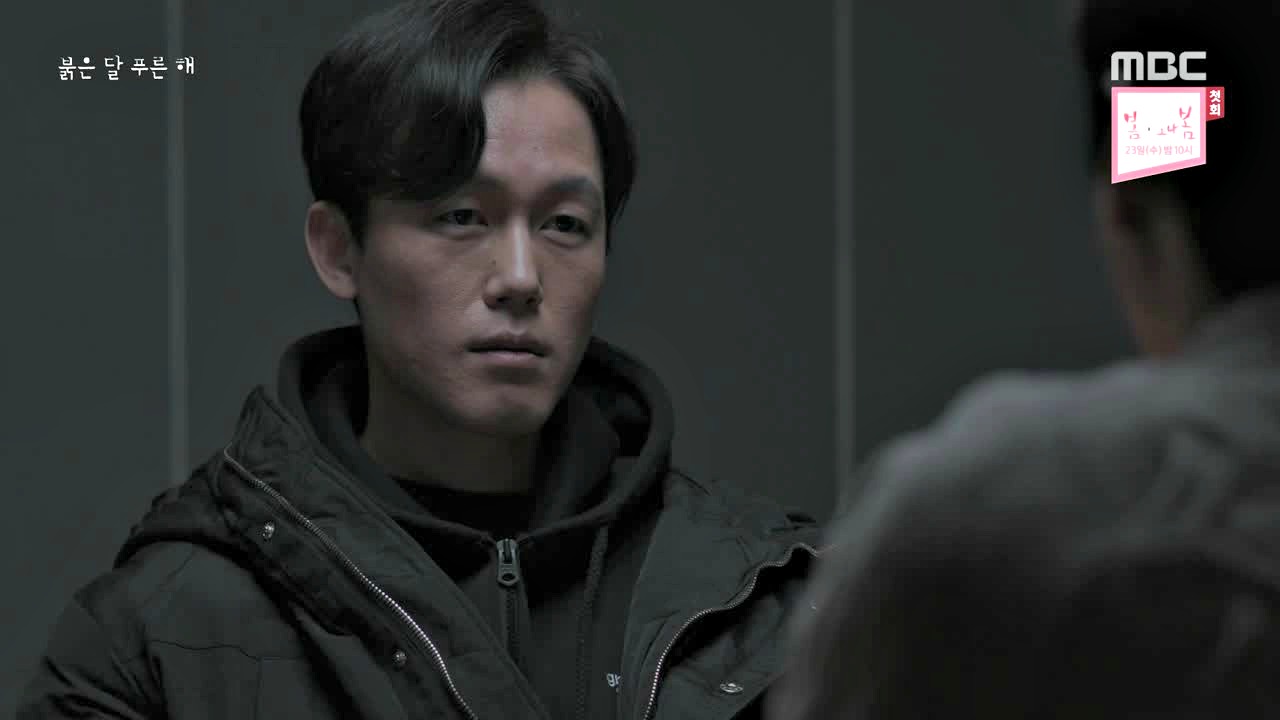
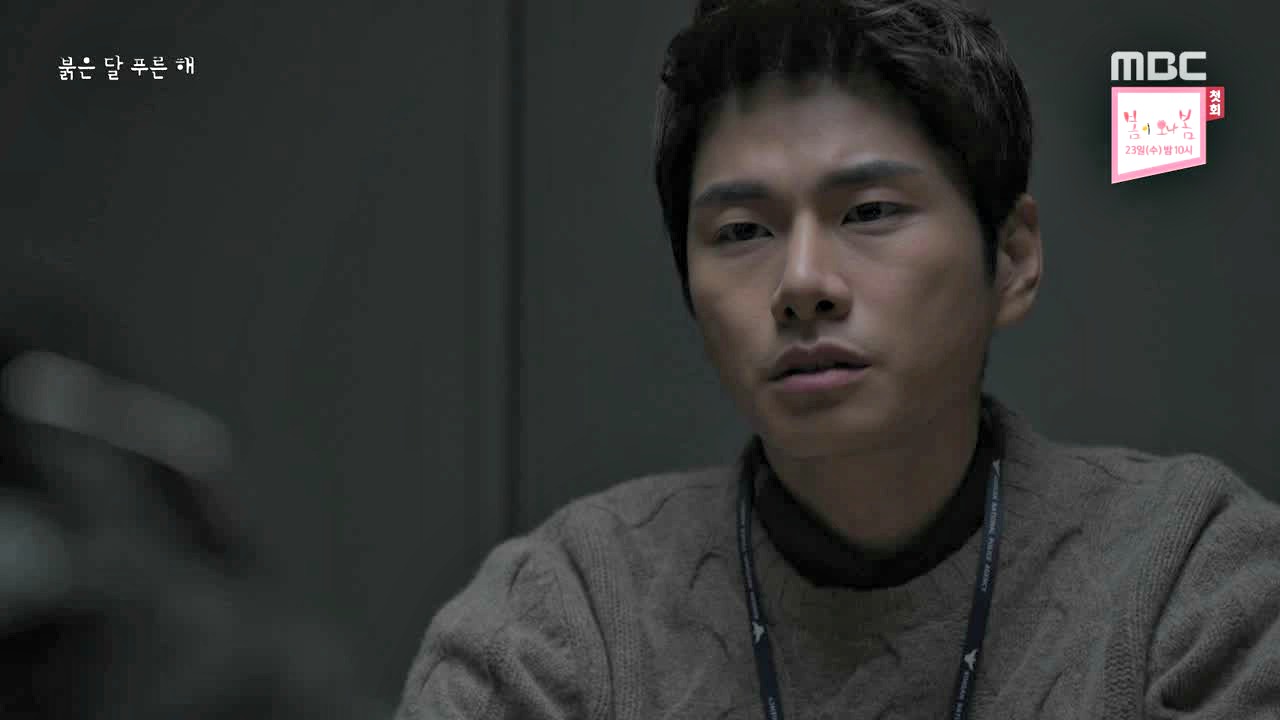
It was the guilt due to his relief that he wasn’t abused like the other children, and the rage from seeing children abused without anyone doing anything about it, that helped create Red Cry.
Ji-heon admits he feels the same murderous rage when it comes to child abuse, but unlike those connected to Red Cry, he knows it’s not his place to be the abusers judge, jury, and executioner.
With Red Cry officially captured, the case is also officially closed. Ji-heon despondently turns in his case file to Captain Hong, wondering if the captain ever felt conflicted about capturing a criminal.

Captain Hong reminds Ji-heon that he had warned the younger detective to not get personally involved. But he reassures Ji-heon that it’s okay if he’s conflicted about the results — it’s part of being a cop. The trick — which isn’t easy — is to just focus on the next case and the next criminal.
At the pier, Woo-kyung sets down flowers in remembrance of Eun-ho. Ji-heon meets her there, and Woo-kyung tells him that Eun-ho was jealous of his life, since he assumed Ji-heon must have had an easy childhood.
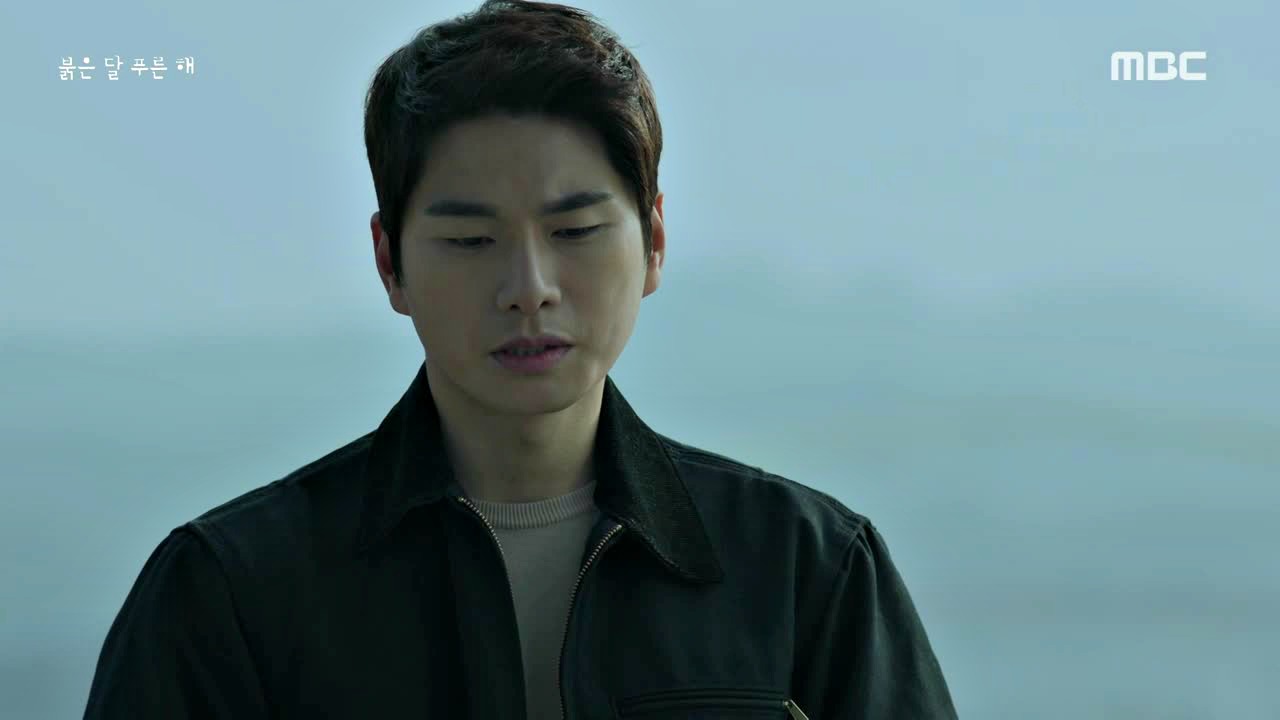
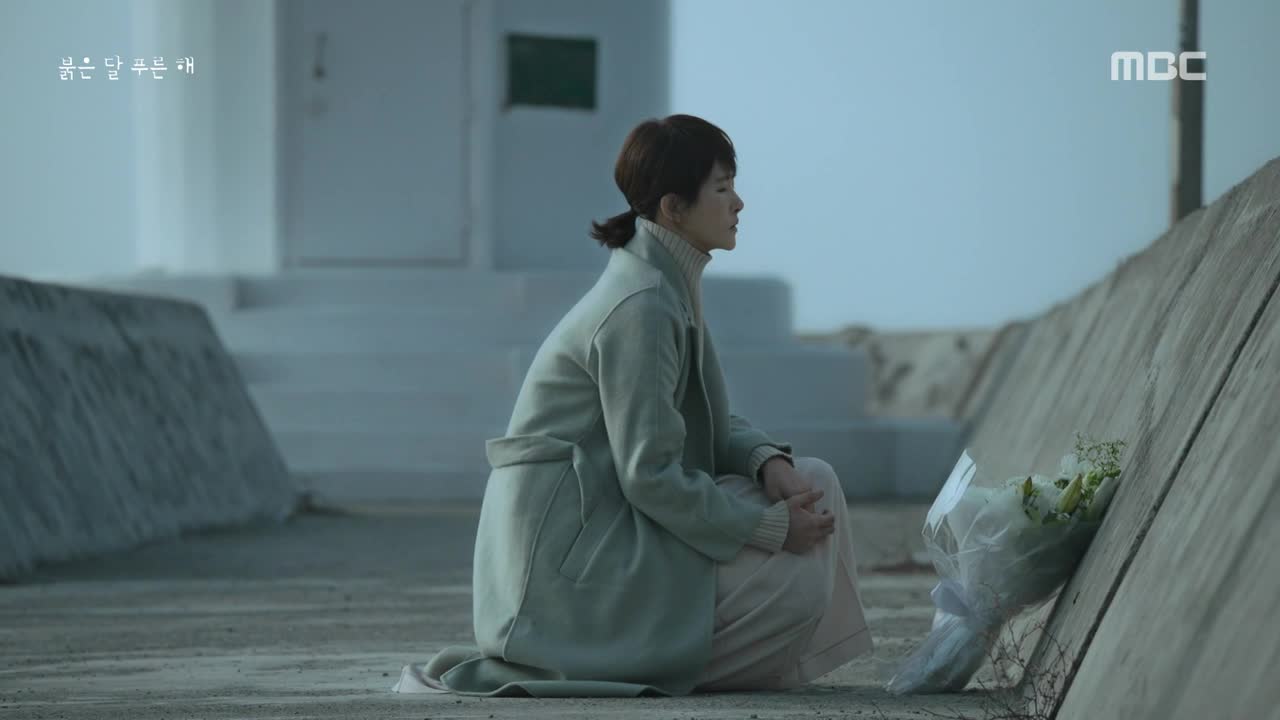
Ji-heon muses that, unlike Eun-ho who loved being surrounded by kids, Ji-heon’s never gotten along with them. He instinctively thought of kids as a nuisance and a burden, which makes me think those are things his parents called him when he was growing up and is likely why he hated the thought of his girlfriend being pregnant.
But Ji-heon confesses that, after working with children like Ha-na who so easily showed him affection, perhaps children wouldn’t be such a terrible burden after all.
Woo-kyung admits she hasn’t been able to forgive her stepmother yet, and doubts that she ever will. But she won’t completely cut ties because of how much Eun-seo loves her grandmother. Which is probably why Dr. Yoon was so furious with her, since she chose to let her stepmother live instead of punishing her.
Watch the video
Being alive gives you possibilities
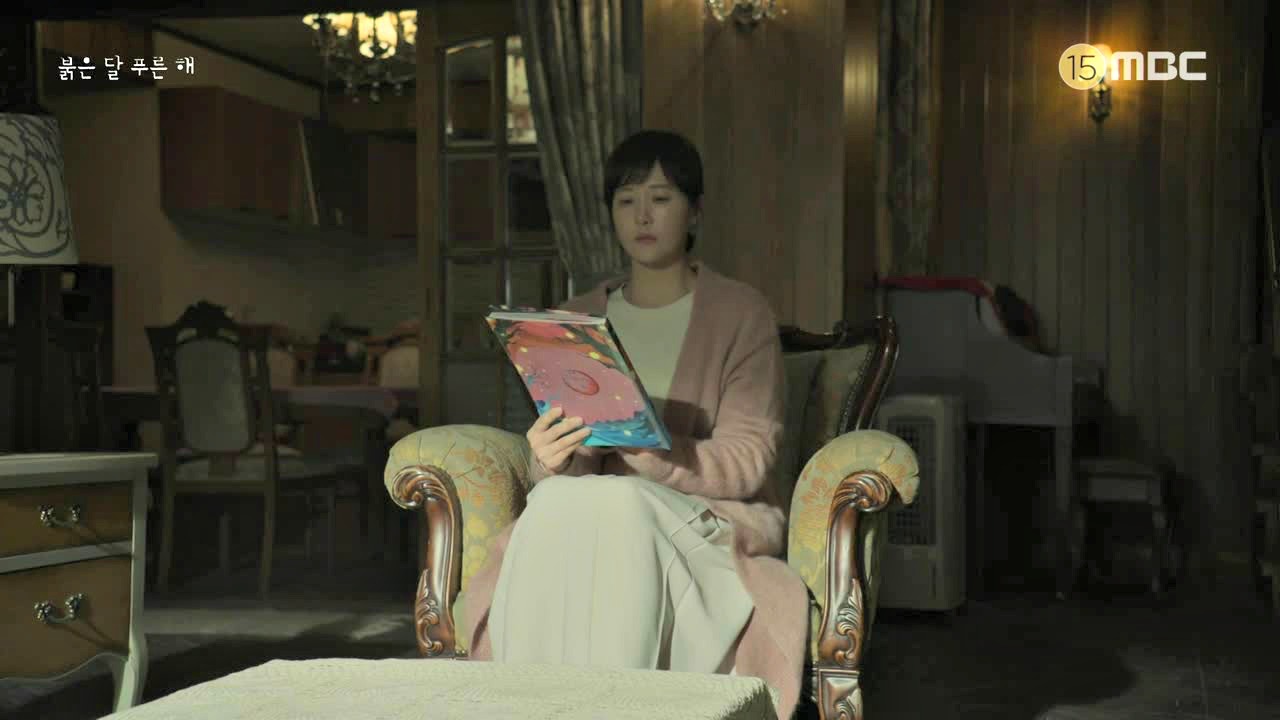
Later, in her stepmother’s living room, Woo-kyung reads the children’s story of Red Moon, Blue Sun:
Terrified of the darkness, the moon cried every night. “Sister, I’m scared!” The sun, who felt bad for her younger sister, decided to switch places. That’s why the blue sun came to shine on us at night, and the red moon now shines during the day. The Red Moon became the sun, and the Blue Sun became the moon.
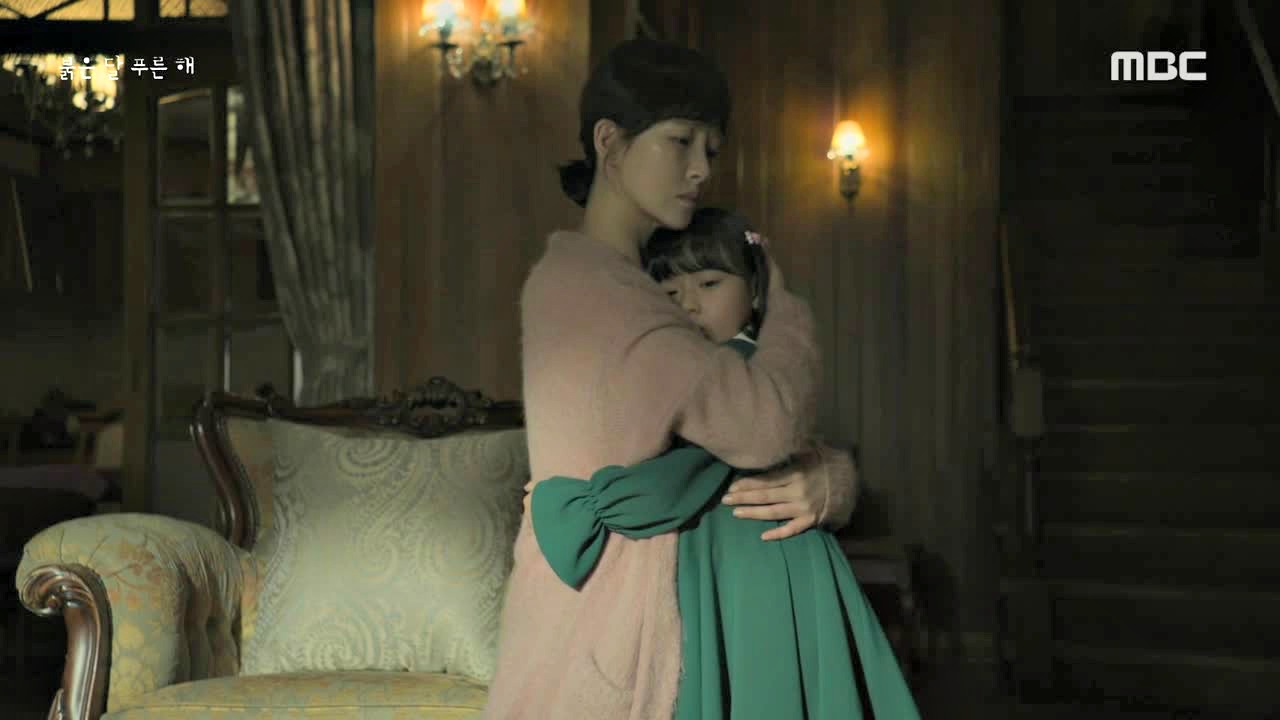
COMMENTS
I wasn’t sure how this drama would be able to resolve everything in just one hour, but somehow it all worked. I don’t mind that not every loose end was perfectly tied up — I don’t need to know the details about Ji-heon’s childhood when this show has taught me to read between the lines, inferring that he likely heard himself called “nuisance” and “burdensome,” which is why he was so afraid of having children. I don’t need to see Soo-young get justice against her horrible stepbrother, because she now has Ji-heon and Chan-wook to create a new brotherly bond with. I don’t need to know what kind of criminal sentence Dr. Yoon faces for the murders he’s committed, because I know he’ll forever be tortured over the guilt for what happened to his brother. I don’t need to see Woo-kyung finally forgive her stepmother, if she ever does.
Justice is never as easy or simple as we would like it to be, even though dramas so often excel at giving us the satisfaction we crave. The good guys win! The bad guys lose! But who, exactly, are the good guys or the bad guys? Are the police the “good” guys because they catch criminals? But they’re also the ones that allowed these children to be abused in the first place — if there’s no proof of anything illegal, then there’s nothing the cops can do about it. Ha-na was returned to her dog-butcher father because the courts decided he wasn’t a threat. Does that then mean the police are the villains?
We can all agree that Ha-jung’s death was unnecessary — she felt truly contrite about the way she treated her daughter, so there was no reason to convince her to kill herself. In that way, Red Cry is the villain for an unjust death. But then it was also so satisfying to see Ha-na’s father hanging from a butcher’s hook like one of his dogs. How can we both revile and cheer for a murderer? Are we the good guys? Or the bad guys?
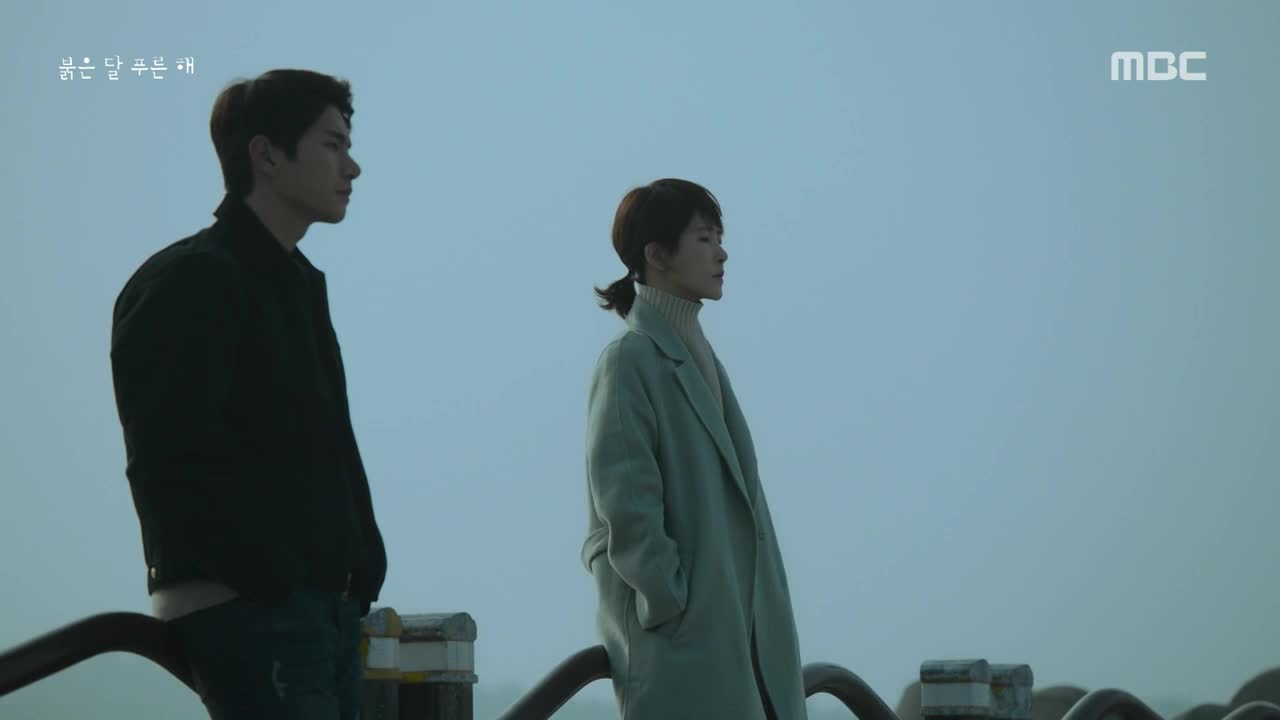
Life is messy and complicated and the reasons people do the things they do — or the excuses they give themselves for acting the way they do — are also messy and complicated. Awful people exist in this world. They always have, and they always will. I can’t deny that there might be a part of me that wishes Red Cry could appear and somehow right the wrongs that the official systems can’t seem to fix on their own.
But, like Woo-kyung, I also know that life is precious and dynamic. The actions someone committed thirty years ago may have been truly horrific, but what of that time in-between? What about the lessons learned along the way that have shaped them to be a different person than they once were? What about the potential of who they could become in another thirty years? Yes, there’s always a chance someone could go down a path that’s darker and more horrific than the one they’re on — but there’s also a chance that they could make the world a better place for themselves and their loved ones. By allowing her stepmother to live, Woo-kyung gave her (step)sister the ability to receive the mother’s love and care that she had never experienced before. Maybe Mom will never be redeemed in Woo-kyung’s eyes, but because Woo-kyung wasn’t her stepmother’s judge, Se-kyung can now discover a new life as Song-yi.
It breaks my heart, of course, that Woo-kyung learned all these lessons at the cost of her younger sister who never had a chance to see past age five. But Se-kyung — the real Se-kyung — still managed to live on, being the source of peace and reassurance that her older sister needed. The little girl in the green dress was the reason Woo-kyung could rein in her murderous fury, to keep her from becoming completely like Eun-ho or Dr. Yoon. Maybe Woo-kyung wasn’t able to save her sister, but in the end her sister was able to save Woo-kyung.
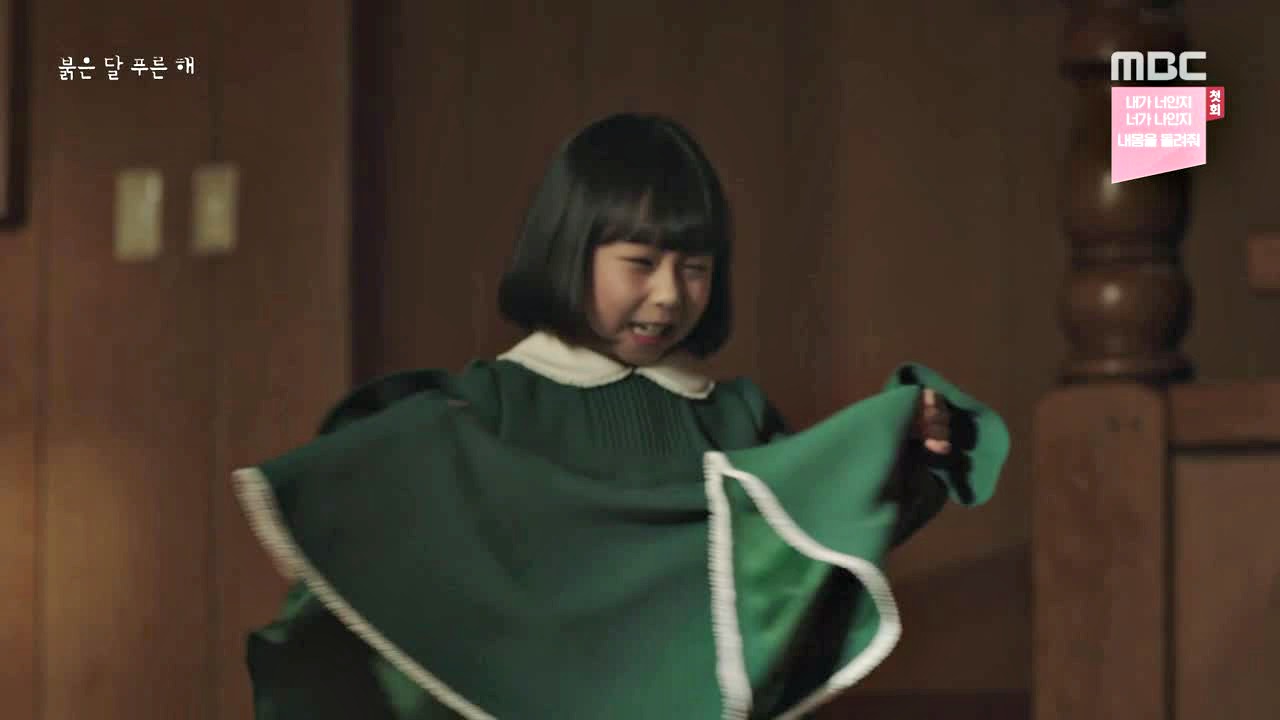
RELATED POSTS
- Premiere Watch: An Empress’s Dignity, Red Moon Blue Sun, SKY Castle, Priest
- Behind the scenes with Red Moon, Blue Sun
- Tragedy and intrigue in Red Moon, Blue Sun teasers
- Mystery-thriller Red Moon Blue Sun releases new stills
- Cast additions announced for MBC drama Red Moon, Blue Sun
- Kim Sun-ah, Lee Yi-kyung tapped for MBC drama Red Moon, Blue Sun
Tags: Cha Hak-yeon, Kim Sun-ah, Lee Yi-kyung, Nam Gyuri, Red Moon Blue Sun
![[Cast Away] A psychometric marries his enemy to foil her plans](http://d263ao8qih4miy.cloudfront.net/wp-content/uploads/2023/09/castaway_header1.png)
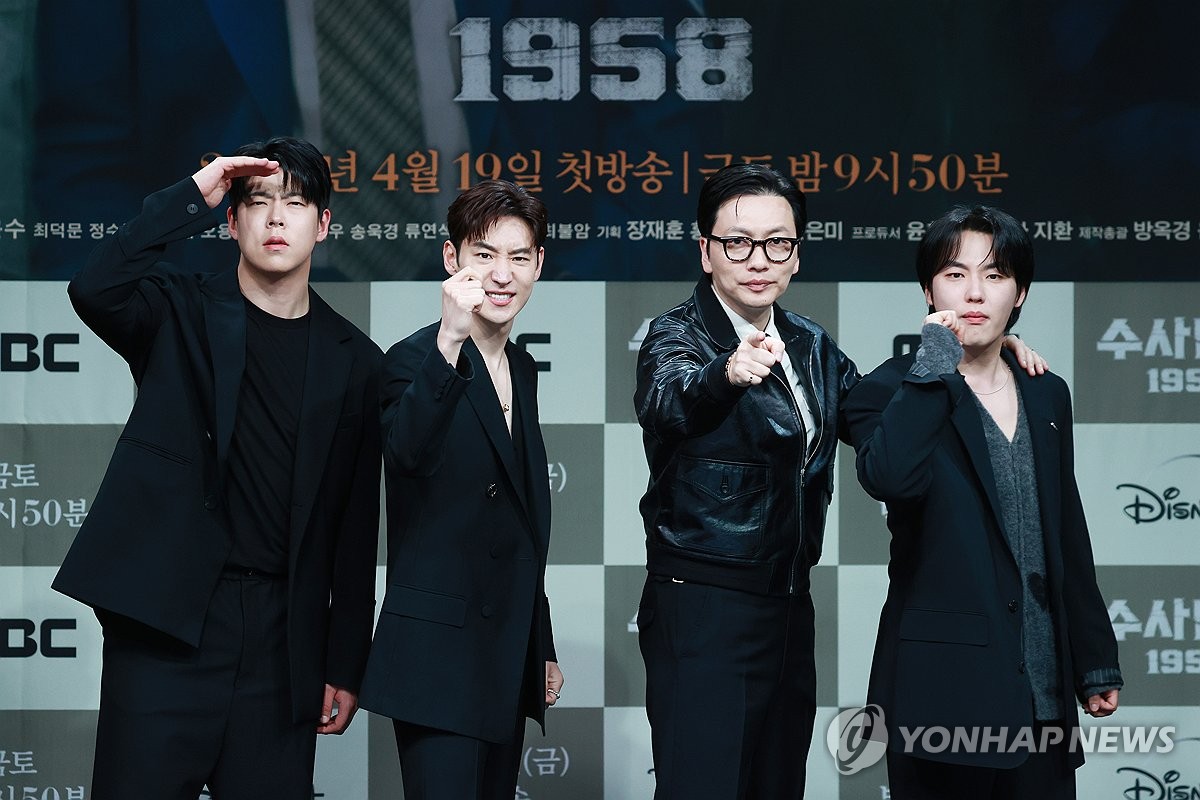
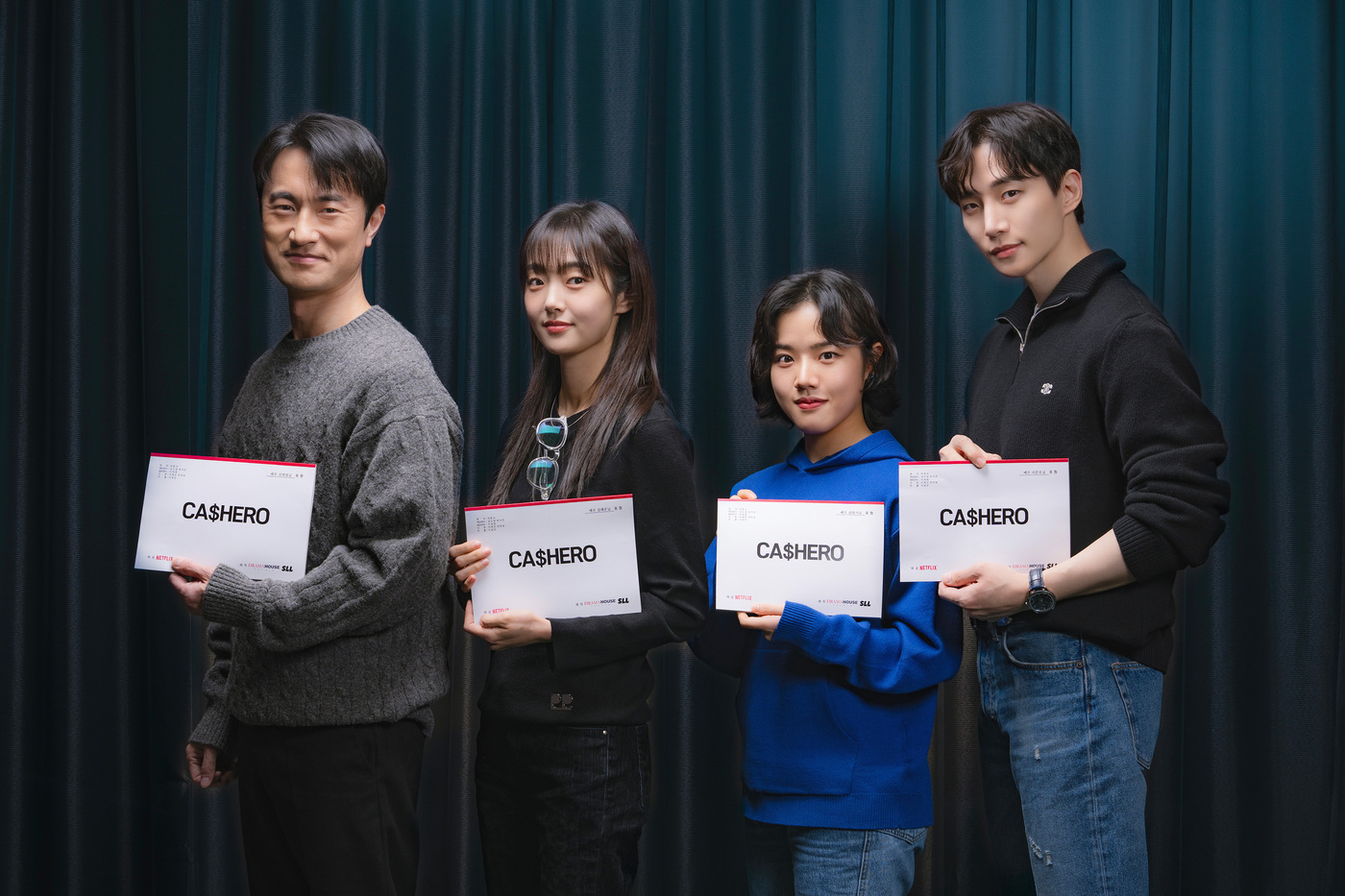
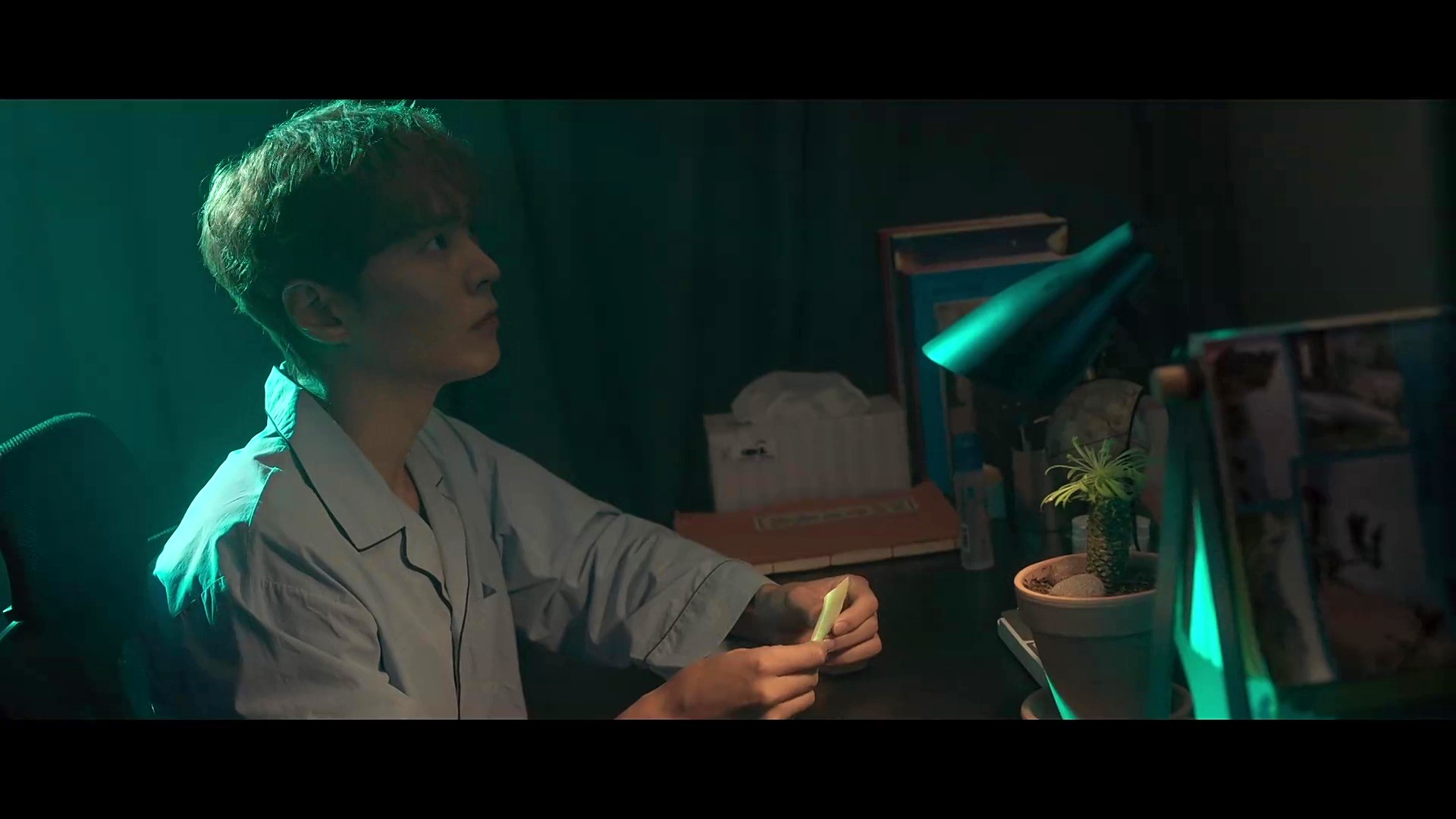
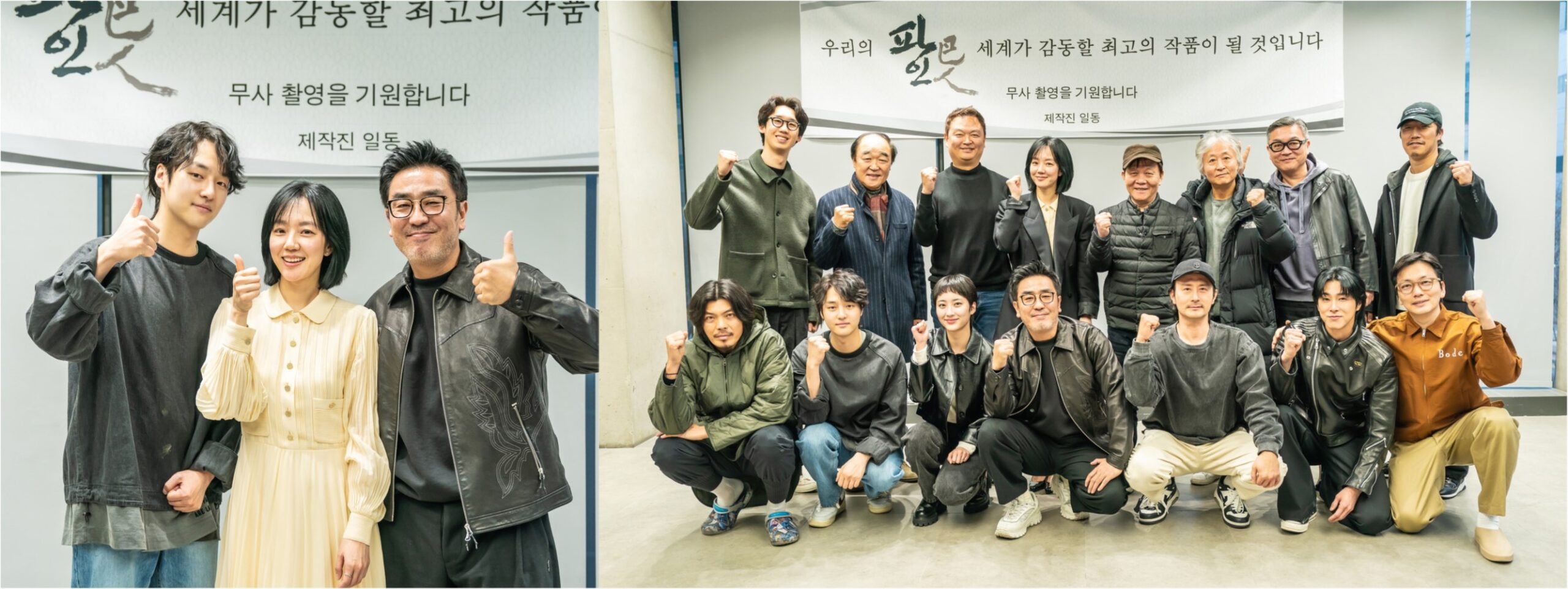
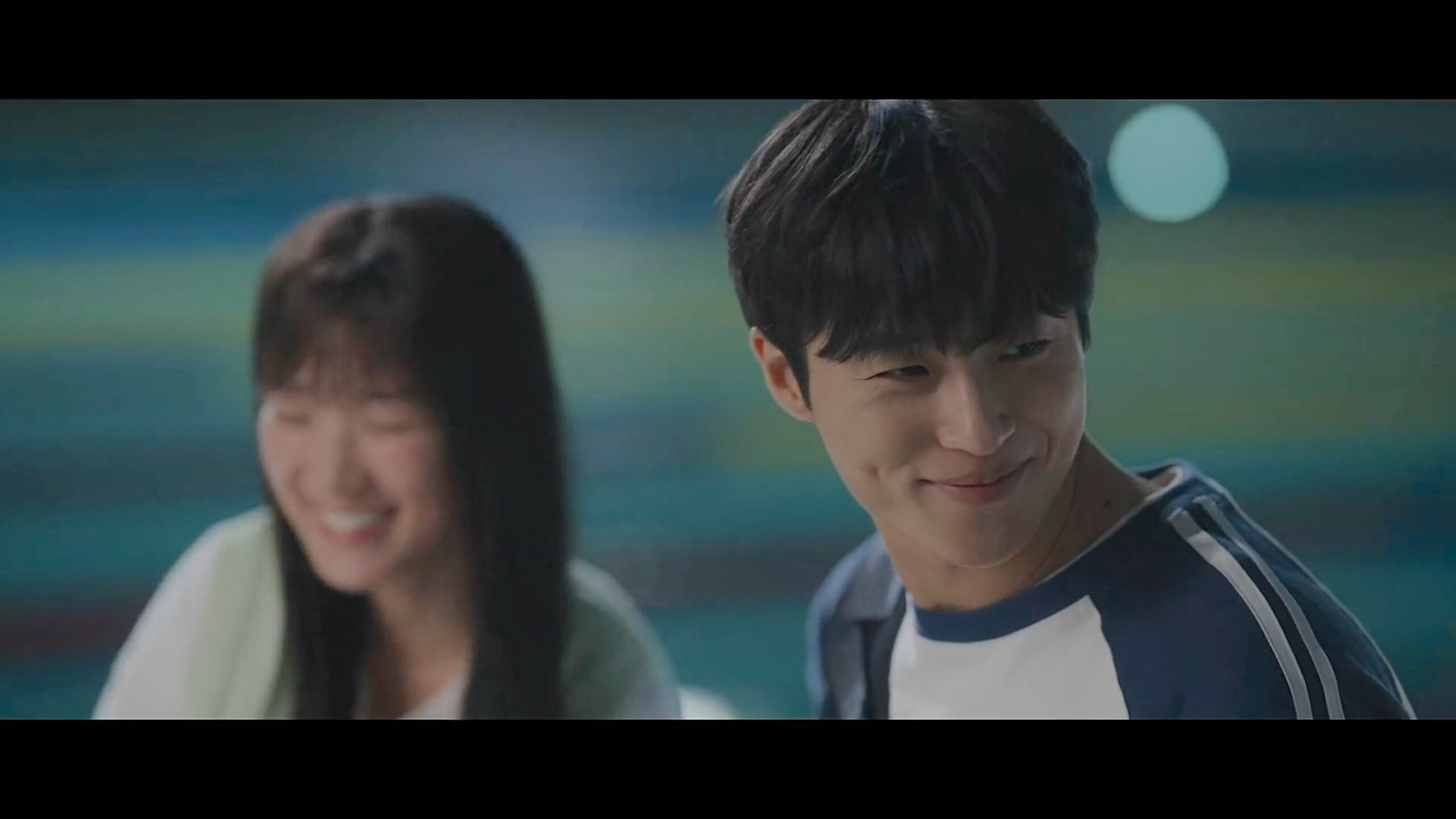
![[Beanie Recs] Dramas about fangirling](http://d263ao8qih4miy.cloudfront.net/wp-content/uploads/2022/05/BeanieRecs.jpg)
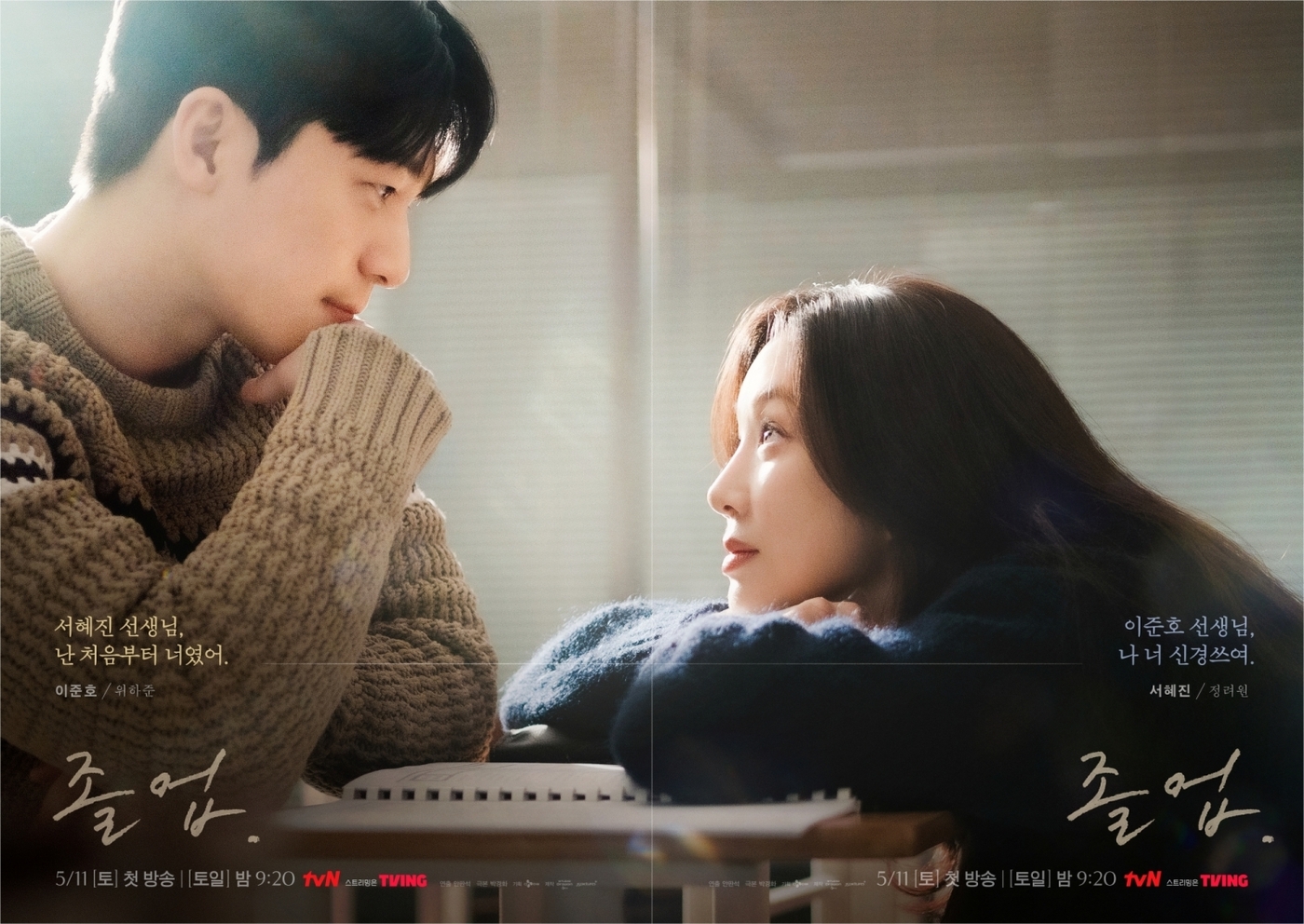
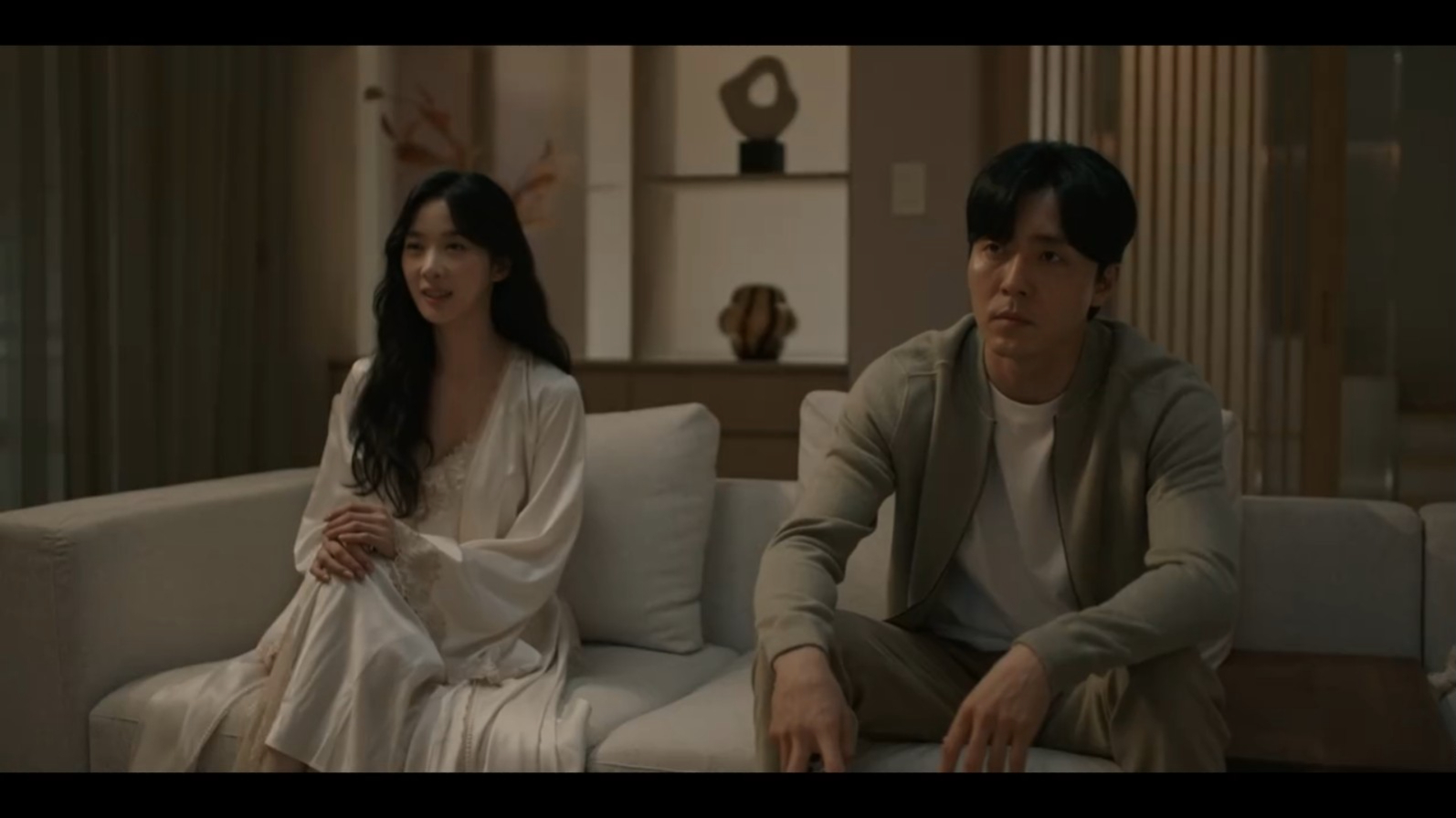
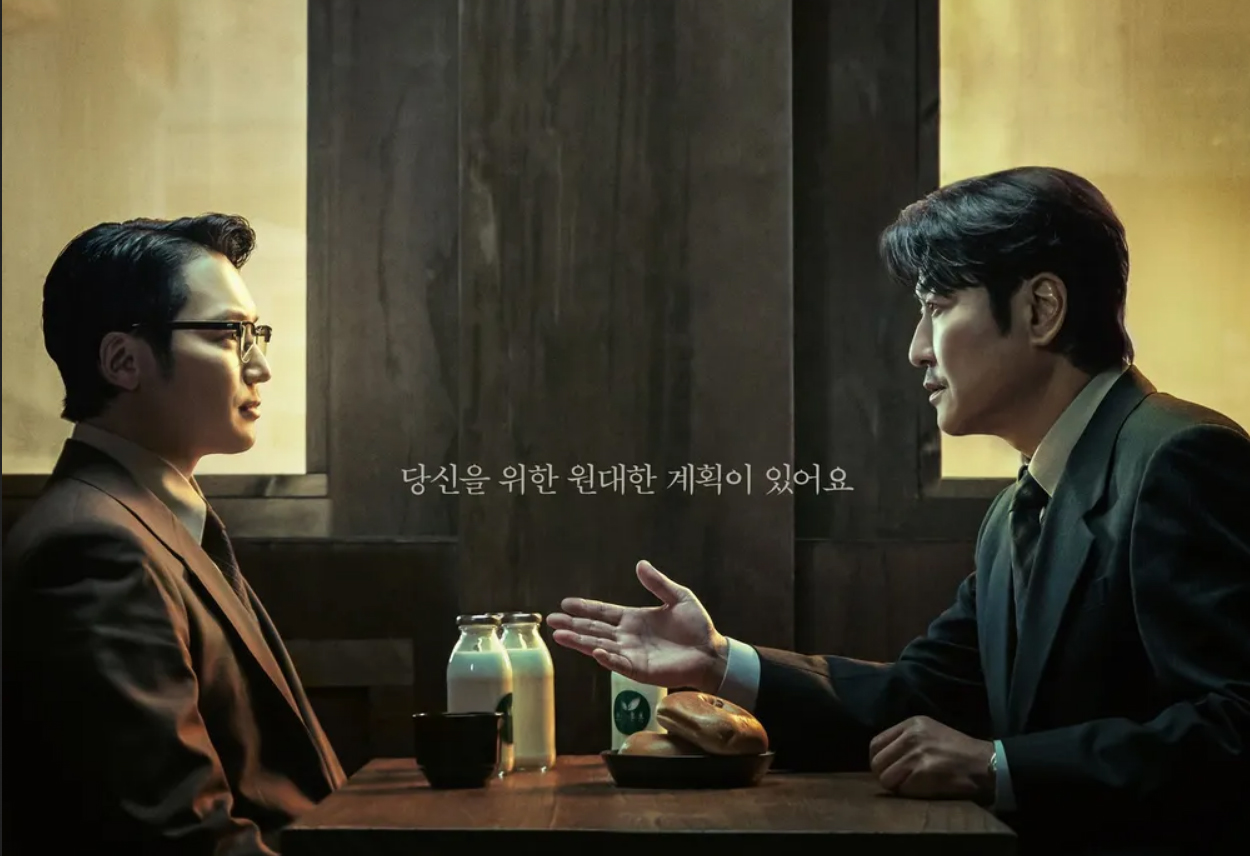
Required fields are marked *
Your email address will not be published. Required fields are marked *
1 gadis
January 24, 2019 at 1:11 PM
This is probably an unpopular opinion, but I actually like this finale eps a lot. It's not the kind of ending that immediately made me happy and satisfied, but it made me sit and think it through and I found myself liking the hopeful tone of the last hour and the emotional journey it took me through.
The conclusion to the mystery of green-dressed girl and Red Cry might be too simple and felt uncomplete, but I come to think of this drama as Woo-kyung's story. This is about her remembering the long-buried memories she has and confronting the lies fed to her by her parents. This is her emotional quest in finding acceptance that she has a bad past that will always become a part of her, but it's okay because it doesn't define her as a person. Even if the story Stepmom told her in the end is a lie (I still couldn't shake the feeling that Dad is much more involved in Se-kyung's death), it doesn't really matter because what's important is the fact that Woo-kyung isn't imprisoned by her obedience to not find the truth anymore.
I found it a hopeful message when Woo-kyung decided to give Stepmom opportunity to a new life. She doesn't necessarily forgive the older woman (and I don't expect her to do that in years afterwards), but knowing that she herself choose not to repeat the same mistake to judge other is a good reminder that she has the power to choose and is free from others' manipulation. The emotional step she took by the end that said she is ready to face her life again is an uplifting ending for her journey. Made even more uplifting because I think she finally saw her peace, hope, and happiness as something unaffected by whatever triumph or satisfaction Red Cry or Stepmom might feel at the end of the series. I'm glad that while healing would be a long journey for Woo-kyung, I think the drama left her ready to do exactly that.
Required fields are marked *
oppafangirl
January 24, 2019 at 1:26 PM
Comment was deleted
Required fields are marked *
oppafangirl
January 24, 2019 at 1:28 PM
I think there was also another reason why woo-Kyung did not judge and decided on trying to forgive her step-mother, she had seen that her step mom did not repeat the same mistake (if she did in the first place, though I really doubt it now) with her granddaughter. Abusive parents can also be abusive grandparents. On the other hand, WK would become a murderer in the eyes of her daughter by stealing away her grandmother, like it was for Bit-na and her mother. Every crime has a punishment but that punishment need not be an eye for eye and a tooth for tooth. The drama tried to tell us that we need to give them a chance for repentance as well.
Required fields are marked *
LT is Irresistibly Indifferent, Dame Judi
January 24, 2019 at 1:49 PM
I loved it from beginning to end.
Required fields are marked *
oppafangirl
January 24, 2019 at 1:58 PM
Me too, it was just awesome. And they portrayed the vigilantism in all its glory and gore. Though I completely detested Ha-na's father, I wished we also got a background on his life. I recently read some where that showing the life of a criminal does not humanizes him but makes us understand what made that human into a criminal.
Required fields are marked *
shach
January 24, 2019 at 2:52 PM
I agree, and too couldn't fathom why WK father would went to such a lengthy and convulted cover up for woman he barely knew at that time (according to WK, SK was 5 when stepmom moved in, so she died not long after).
Required fields are marked *
LT is Irresistibly Indifferent, Dame Judi
January 25, 2019 at 12:04 PM
I have speculated on my fan wall that he didn't go to great lengths to protect his new wife - that it was stepmum who devoted her life to protecting him. I still believe that it was the Dad who killed Se-kyung and the stepmum decided it was her responsibility as a wife to cover that up and to take that secret to the grave.
Required fields are marked *
miss h
January 24, 2019 at 3:48 PM
I was satisfied with the finale when I watched it and also found myself thinking about the ending and liking it more and more.
Required fields are marked *
2 oppafangirl
January 24, 2019 at 1:14 PM
The finest ending of a drama ever. So well written and so well acted. The closing was plain gorgeous and the deep impression and message it left with us will remain forever. Thank you @odilettante for the recaps and beautiful insights.
I love your ending remark.
Required fields are marked *
3 Kurama
January 24, 2019 at 1:32 PM
It was a very good drama! I missed it this week.
I was surprised that the stepmother was the killer of her sister. I was more surprised by the choice of the father. He didn't ask justice for his daughter, he just substituted her with another girl and let his second daughter with his new wife... I understand that it was an accident but it was not the first time neither...
For the stepmother's punishment, the end didn't bother me because she clearly punished herself during all those days. I would have prefered that she went in prison after it but she never showed that she was happy. But I was angry that she tried to avoid the showdown with Se Kyung and Woo Kyung by dying.
Ji Heon will remind my favourite cop in a kdrama for a long time. I really like his instinct and how he could help Woo Kyung. He knew that she was talking with Red Cry but he let her chance to take her own decision. He acted like a cop following his instinct and the facts.
For the identity of Red Cry, I think it never has been the main point of the drama. The world is not black or white and this drama makes us doubt about our own morals.
I want a second season! With the same team of cops, the story rushed a little bit their stories. Even Kim Suh Ah said she wanted one even if she's not in!
Required fields are marked *
growingbeautifully
January 24, 2019 at 6:16 PM
@kurama I believe that the step-mother was careless and rough with the child SK, but that she did not mean for her to die. Step mum did strike me as very similar to Suspicious Housekeeper and Jennifer in 30 But 17 ... ie. someone unable to smile or be happy out of guilt.
Still, when WK confronted her with Se Kyung's remains, it was the wrong thing to say, that she had been suffering too all through the years. It showed that her thoughts were more turned in on herself and on avoiding blame until the end.
I feel the same about Ji Heon. He is a cop character so humanly relatable and likable, so competent and fair, with lots of flaws, yet with amazing instincts and insights. It will be hard to watch another crime show if the cops are less competent or easy to like.
I like how he trusted WK, how he offered Soo Young support and how he regretted that Eun Ho had provoked him into killing him. At the same time, he did not remain despondent, but got up to continue leading his team and helping WK. He was also perfectly self-aware, knowing how to feel and what it meant, but not letting that take over his decisions. So he could not be tricked by Yoon who was trying to hypnotise him by suggestion.
It's a great show that gets us viewers thinking more about life and judging ourselves than merely on whether it was a good ending or a cop out! Heh! 😆
Required fields are marked *
4 another woodalchi nicole recruit
January 24, 2019 at 1:36 PM
I was crying while I read this recap--when everything with the real Se-kyung came to light. I can't even imagine what it would have been like to watch this show--I've just been following via the recaps--but even through that it seems to have been such an outstanding work. (Maybe one day I'll have the guts to watch it, heh, but for now, I'm grateful for this experience.) Really glad I stopped by on this one
Required fields are marked *
oppafangirl
January 24, 2019 at 2:09 PM
As the saying goes "there is beauty in melancholy" this show was putting it to action. Watch it for its amazing and heartbreaking cinematography. The plot was great but the real gem in the drama was acting by Kim Sun Ah and her monologues. I hope one day you will watch it. :)
Required fields are marked *
5 Hobakky
January 24, 2019 at 1:45 PM
I thought the choice of poems in this show was very intriguing, so I’m leaving a quick summary of them here in case anyone wants to learn or discuss about them. I’ll come back later to do another post on my opinion about their purpose.
1. The Leper: A leper desperate for a cure eats a baby because legends state doing so would heal him. But he’s so horrified by what he’d done afterwards that he grieves red cries all night.
2. Kiss: A popular interpretation is that this poem is written to be spell-like to entrance the reader into a kiss that by common sense they shouldn’t otherwise want to do. At the moment they succumb, they have the greatest pleasure possible for a split second but it comes with the greatest price/pain- death. Hence, this is possibly why the beastly laughter is sweet as tears.
3. The Unknown Warrior: A soldier ponders the burden of a fallen warrior on the battlefield by placing the burden of the dead’s flesh on the living’s and wishing for their transition to an eternal tree. Eunho had switched out one of the instances of flesh for “crime” so that the resulting stanza would read, “The rotten and corroded flesh, the weight of that crime, in the times we think of you, it becomes the weight of our own flesh. From the moment your whole body becomes buried in the Earth, may your bones become everlasting roots.”
4. The Odyssey (*I’m not entirely sure the exact title translation): This poem was way too long and complicated for me to translate since it is intended to be a parody and relies heavily on double meanings, irony, and paradoxes. An analysis I skimmed about it seemed to imply that it was meant to demonstrate how our world is a cynical place full of contradictions and nonsensical qualities, yet as humans living in this world we nevertheless choose to believe that the nonsensical can be reasoned out and look towards a better tomorrow. I believe the line taken from this poem “We all sin but feign innocence. Living like dogs, save a human” in its original context could be a way of saying, “We all inevitably live like we’re less than human, hold fast to your humanity.”
5. You Whom I Cannot Save: A poem about a priest lamenting over a disciple(?) that he sees suffering with darkness within them, but because they have chosen solitude and turning their back on others there is nothing the priest can do to help except continue to send up futile prayers on their behalf. I think the line, “The dung of sadness. The food of dung” could be intended to indicate an unbreakable cycle the disciple is in. The outcome of sadness feeds more of that very outcome and leads them into an unstoppable downward spiral.
Required fields are marked *
oppafangirl
January 24, 2019 at 1:50 PM
Please tag me when you post about their meaning and purpose. I would love to read.
Required fields are marked *
Karmen ~ 🍜🏢🎭 ~ 📚☔🦋 ~ 🪂🌱💘 ~ ✨🍊💫 ~
January 24, 2019 at 3:00 PM
Thank you very much, @hobakky!
Required fields are marked *
Peridot
January 24, 2019 at 4:02 PM
I have seen the followings translations of The Leper:
First Source: https://jaypsong.blog/2013/01/16/the-leper-by-seo-jung-ju/
"The sunlight from the sky
filled the leper with sorrows.
He gobbled up a baby
when the moon rose over the barley field.
All night he cried scarlet cries like flowers."
And the second translation source: http://trilingualrookie.blogspot.com/2014/02/word-wednesday-seo-jeong-jus-poem-leper.html
"By the sun and the light of the sky,
the leper grows sorrow
When the moon rises above the barley field
A child is eaten
Tears as red as a flower falls at night"
My Interepretation, based on the first source:
It is interesting that our child-avenging vigilante chooses to identify as Red Cry. Based on the first poem, I interpreted the "scarlet cries" as the cries of the defenseless (dead) child. And the child's cries are all that are left, the only ephemeral reminder of the crime committed. By calling himself Red Cry, I believe that our vigilante decided to become the voice--so to speak--of those abused children that could and cannot speak for themselves. (The second translation is much more ambiguous. I was looking over the Korean, but I am nowhere near fluent enough to provide my own translation and interpretation based on that translation.)
Required fields are marked *
Hobakky
January 24, 2019 at 4:44 PM
Comment was deleted
Required fields are marked *
Hobakky
January 24, 2019 at 4:47 PM
That's a really interesting theory about the use of Red Cry. I've always thought the poem was only about the Leper's point of view, especially since the use of -고 indicates a conjunction of sentences that I assume both have the same subject.
I just saw a really interesting article analyzing the trend in dramas and movies this past year (Mother, Children of Nobody, Miss Baek, and A Family) and how they all deal with not just child abuse, but mothers who don't get the support that they need, which potentially leads to child abuse. It had a really interesting ending point that in a country that is pushing childbirth because of the low birth rate crisis, it's unfair that they leave the raising of the child completely up to the mothers' means. In this era of polarizing public opinion and economic hardships the country should be listening closer to the hidden red cries coming from its people.
On that note, it's possible that Red Cry could be a way of representing the cries of help from stigmatized people (the leper, orphans, abuse victims etc.).
Required fields are marked *
Peridot
January 25, 2019 at 7:08 AM
"-고 indicates a conjunction of sentences that I assume both have the same subject."
The lines from the poem (which I copied from the first source I linked in my above post):
애기 하나 먹고
꽃처럼 붉은 우름을 밤새 우렀다
I guess I looked at it like this: the leper is the one physically crying, but the cries are of the child that he has eaten. I hope that makes sense. And as I wrote to @growingbeautifully, I chose to focus on the child because I wanted to know why our vigilante chose to call himself Red Cry.
Required fields are marked *
Peony
January 24, 2019 at 8:58 PM
I always interpreted THE LEPER as a poem that made readers sympathize the abuser(leper) instead of simply pointing fingers at him, by saying he wasn't happy with killing an innocent child either but had to do it due to the circumstances, and he was SO distraught to the point that blood flowed from his eyes instead of tears. Think about...like, Hana's mom? Porn star mom? Oh, that makes me wonder why did Red Cry chose to be considerate towards the latter and not the helpless, sick, young Hana's mom.
Anyway, I always found it hard to understand why did Red Cry choose a poem that approaches the issue from the abuser's side, which is quite the opposite from what he does?
Required fields are marked *
KDFL
January 25, 2019 at 1:44 AM
I think it has to do with the fact that EW hated poetry; poetry to him was a reminder of the memories he had with the chairman.
Required fields are marked *
Peony
January 25, 2019 at 10:02 AM
He hated them, but at the same time he chose the poems most apt for each "judgement" scene. I understand all his other choices, except this one.
Peridot
January 25, 2019 at 7:13 AM
I too see the leper in the poem as a tragic figure. And the cries could represent his desperation, his guilt, and his pain. I focused, however, on the possibility of the tears belonging to the child in an attempt to understand why our killer adopted the moniker, Red Cry.
I would also like to know why the other mother was given a second chance but not Hana's mother.
I like the points you made. :)
Required fields are marked *
growingbeautifully
January 24, 2019 at 5:56 PM
Thanks @hobakky I am always interested in how different art forms flow and merge and support each other, and poems/literary works in drama often offer additional meaning or sub-text, enriching the whole. They are interesting to analyse and compare with the tale to see how they contribute or contradict.
I saw 'The Leper' as the source for the name, Red Cry. While I agree with @peridot's interpretation from Yoon's point of view, from another perspective, the cries are both the leper's and the child's.
Eating the child's liver is supposed to heal the leprosy, but of course it doesn't. All we have is a corpse and the leper's body still remains diseased. A possible indication of the futility of Red Cry's vigilante's efforts. He may take the law into his own hands to rid the disease that afflicts a few, but this ultimately results in his own deterioration into guilt, without ever changing the system that brought about the lack of protection for children. He remains a leper, no matter how many children (abusers?) he eats. Many abused persons cannot be protected, although there are a few who are saved. 😐
Required fields are marked *
Peridot
January 25, 2019 at 7:00 AM
Good points @growingbeautifully
I too agree that there is the possibility that the "red cries" could belong to both the leper and the eaten child. The poem seems ambiguous in that way. I focused more on the idea of it belonging to the child because I tried to figure out why our vigilante would have chosen that name for himself. But I like what you wrote, connecting Red Cry to the leper himself.
Required fields are marked *
growingbeautifully
January 25, 2019 at 8:37 AM
@peridot I read the explanation of The Leper that came in one of the links above. I guess a Korean will say that the red cry is the leper's because although they drop the 'subject' in Korean, the way it's written makes it clear to them whom they are referring to.
Still, however, I'd like to interpret it as if it is ambiguous. 😜
Required fields are marked *
Peridot
January 26, 2019 at 11:32 AM
Please see my reply to @hobakky above regarding the hangul and the subject/verb connection with regards to the eating and the ensuing tears (lol, that was worded strangely).
And yes, ambiguity (of the non-frustrating kind) can be a good thing. :)
6 Kafiyah Bello
January 24, 2019 at 2:12 PM
This drama was sooooo satisfying. Beautiful, tragic, happy, sad, and so very very human. Perfect😍😍😍😍😍😍😍😍😍
Required fields are marked *
7 Lord Cobol (Kdramas, like water, flow downhill)
January 24, 2019 at 2:15 PM
Only if they don't want Alhambra-level complaints...
... but I'm having fun imagining the reactions if they didn't wrap it all up :)
Required fields are marked *
8 Lord Cobol (Kdramas, like water, flow downhill)
January 24, 2019 at 2:29 PM
Do people really keep bodies nearby? *cough*Dexter*cough* Or was it just an excuse to have a sinister fireplace and a dramatic family "reunion" there instead of having to dig in some forest?
"Found family" is a common kdrama thing, but finding your family that way gives it a whole new meaning.
Required fields are marked *
oppafangirl
January 24, 2019 at 2:36 PM
You won't believe me but many times wifes where found in their husbands refrigerators! (It was a real incident in the town neighboring my town but almost 6000 km away from South Korea), so its definitely not a kdrama thing. (Half of my country's newspaper is filled with such stories almost every other week.)
Required fields are marked *
shach
January 24, 2019 at 2:48 PM
Murder is easy, it's the cleaning that take a lot of effort, and for laymen not on Dexter level trying to get rid of the body and evidence is when they are usually get caught ;)
Required fields are marked *
KDFL
January 25, 2019 at 1:49 AM
Like WK said: how could they bury her there in the place where they ate, laughed and spent most of their time in? How could they? What a horrifying thing, and to keep it a secret for that long. Of course I hate the stepmother and what she did was unforgivable, but I hate the father even more. To be able to do that, what a horrifying person, a true monster.
Required fields are marked *
9 Karmen ~ 🍜🏢🎭 ~ 📚☔🦋 ~ 🪂🌱💘 ~ ✨🍊💫 ~
January 24, 2019 at 2:51 PM
Thank you for the wonderful and incisive review!
This drama is the best mystery I have ever seen.
The theme of abused children is one I am very interested in and it is treated with extreme sensitivity.
It's a show that pushes the viewer to think and to ask questions to themselves about themes like second chances, what's right and what wrong, what justice means, how much one can forgive.
The acting was great, as the characterization. I ended up caring for all the characters.
I will not forget this drama and its precious children easily.
Required fields are marked *
oppafangirl
January 24, 2019 at 3:01 PM
Have you seen I remember you? and Mother? They both also deal with the same issue. But in a very different way.
Required fields are marked *
Karmen ~ 🍜🏢🎭 ~ 📚☔🦋 ~ 🪂🌱💘 ~ ✨🍊💫 ~
January 24, 2019 at 3:06 PM
Hi @oppafangirl. I plan to see Mother as soon as possible, while I don't know I remember you. I will google it right now, thanks for the recommendation.
Required fields are marked *
oppafangirl
January 24, 2019 at 3:11 PM
Mother: Keep tissues ready and you are in for an amazing ride.
I remember you: It had the most amazing point of view of a serial killer and has lot of wonderful insights on how he thinks.
And deals with the questions of what turns a child to murderer?
Required fields are marked *
Karmen ~ 🍜🏢🎭 ~ 📚☔🦋 ~ 🪂🌱💘 ~ ✨🍊💫 ~
January 26, 2019 at 7:14 AM
I remember you seems interesting!
Peridot
January 24, 2019 at 4:03 PM
I believe that "Mother" is a gem. I hope that you enjoy it. :)
Required fields are marked *
10 mk
January 24, 2019 at 3:55 PM
So I don't agree at all that Dr. Yoon was angry at Woo Kyung's decision. I saw him as being surprised and relieved that he no longer had the burden of the cruaade of hatred and that she was free without his murderous help. He seemed so exhausted when he told her she did well, and I think he was sincere. His ultimate motivation was to relieve the victims of pain (remember, Red Cry encouraged women to kill their abusers. He/they only meted out vengeance when there was no o e else to do it).
Also, the drug wasn't to hypnotize, it was a way to open up people to be more open to hypnotism. Probably using a sedative of some sort.
What an amazing show. One of my top yen for sure.
Required fields are marked *
11 witchyromance
January 24, 2019 at 4:35 PM
Ultimately I'm fully satisfied by this conclusion and I think everyone's actions are understandable even if they aren't necessarily comforting.
But I haven't been able to get this one thought out of my head about the theme of responding to the suffering of a sibling -- in most of the instances it was a child responding to things happening to their younger sibling and it's understandable that they would try to avoid the matter as much as possible. But with Dr.Yoon, as painful as I'm sure it was, he was an adult and a psychologist no less. I would think he would have a better toolkit for dealing with this.
I was joking with myself thinking, "on a scale of zero to letting your brother become a vigilante serial killer how bad are you at dealing with someone else's abuse?"
That said, its really a lesson about processing grief, particularly when it isn't your own.
Required fields are marked *
growingbeautifully
January 24, 2019 at 5:23 PM
@witchyromance
LOL... on a scale of 0 (not feeling a thing) to 9 (becoming a vigilante killer) to 10 (allowing or encouraging one's sibling to becoming a vigilante killer) ... I think I'd rank a miserly 4 (feel aghast enough to report to authorities). 😉
Required fields are marked *
12 growingbeautifully
January 24, 2019 at 5:18 PM
Thanks so much @odilettante for recapping and reviewing this difficult to watch but oh, so provoking show. I know it was not easy to bring up the recap every week. 😃
I find that I wrote a some length my thoughts about the show in the Team Dramabeans: What we are Watching thread ... about the significance of the name of this show. So I'm just leaving the link here... http://www.dramabeans.com/2019/01/team-dramabeans-what-were-watching-139/#comment-3392961
I was struck by your insight that, that 1 sentence as to why Ji Heon was not happy with children, likely contained the sentiments applied to him. If he had been a berated child who never obtained much approval for being a child (a kind of abuse as well?), it could explain his dismay at having a child of his own.
Because he now has a more positive view of having children, because he realises that he's (and so too Woo Kyung) similar to Red Cry in wanting redress for those who are abused and yet different in that he does not get above himself to be judge and killer, I find this show immensely hopeful. At first I thought vaguely hopeful, but now I think, very hopeful.
The human spirit has risen above all kinds of abuse, tremendous pain and rage, risen above resentment and revenge, to choose the better path. It's not a smooth or straight path, but a very real one. If Woo Kyung could reach the point of forgiveness, it will be a path to great peace.
I mentioned in the OT that the only thing lacking (that I feel strongly enough to mention) is that although there were hints as to Yoon's true intentions, his story was revealed too late for viewers to have the chance to make more guesswork as to: 'is he or isn't he'. Other than that, I guess I have no complaints.
In every way that the story held well together, that we received a wonderful crime-mystery to unravel, that we had likable characters to journey with and root for and interesting twists to drop jaws over, and so much angst, sorrow and relief to feel, this show was quite perfect.
I applaud the Production Team for bringing everything together so wonderfully well, ie. for an execution well done. Kudos to all and may we meet again soon (I really hope so!!!) in another show! 😍 😋 😁
Required fields are marked *
13 psycho
January 24, 2019 at 6:39 PM
While I would've liked to know more about Ji Heon and Soo Young - it is unfortunate that the drama couldn't balance their stories with the other ones told - and the final Red Cry wasnt as good as Eun Ho I still enjoyed the final hour of this drama, the final scene especially made it all come together, it reminded me that at the end this was Woo Kyung's story and in a way it was fitting that the last case was hers.
Required fields are marked *
14 BC
January 24, 2019 at 7:25 PM
"Later, in her stepmother’s living room, Woo-kyung reads the children’s story of Red Moon, Blue Sun:
Terrified of the darkness, the moon cried every night. “Sister, I’m scared!” The sun, who felt bad for her younger sister, decided to switch places. That’s why the blue sun came to shine on us at night, and the red moon now shines during the day. The Red Moon became the sun, and the Blue Sun became the moon."
At the end WK understood the message of this story and me as well...
Parents often don't remember that they physically or mentally abused their children, in their memories they were perfect parents and don't feel regretful over some "behaviour corrections". Yes you can't have a child having everything he desires or wants to have, frustration is important part of growing, but there are limits that shouldn't be crossed. Every child is looking at the abuser in the same way as when any adult is pestered or scolded by his/her boss, by the society, by legal authorities, etc. Nobody wants to take a place of the person abused. There're some exceptions which's leading to some kind of revolution and self reflection but mostly people silently watch or start to participate in abuse themselves. It's strange that mothers seeing their child abused by somebody else would replace themselves with him/her or would jump to cover the child and get beaten themselves, but they can easily become the same monsters as the former abusers.
Loved this show to bids! Thank you writer for it and everyone involved.
Required fields are marked *
Asaki
January 24, 2019 at 7:58 PM
"Parents often don't remember that they physically or mentally abused their children... "
That's unfortunately so true. My mother used 'physical disciplines' when I was growing up, and now as a grown up woman I still have some resentments. But whenever I remind her about that, she looks upset saying 'was I bad mother to you? It is like that in any other famiy'. I mean I love her, but I still shiver when I hear footsteps behind the door and start cleaning stuff around me in panic bc she used to find any reason like a mess in a room to beat me and I still clearly remember how one time I was kicked repeatedly for not taking good care of my brother.
This show was really hard for me to watch, I was crying most of the times as it trigerred so much memories. But I'm really glad they made the drama this complex and compelling and kept the quality till the end.
Required fields are marked *
growingbeautifully
January 24, 2019 at 9:46 PM
Thanks for sharing @asakichan. It can't be easy recalling those frightening moments of the past. It's also challenging to behave differently from the way we were brought up, even if we do not approve of what we had to face.
Required fields are marked *
BC
January 25, 2019 at 9:02 AM
It's strange, but physical punishment from my mum didn't bother me as much, I was provoking a lot my mom - a child which is laughing at your face while being beaten slightly so it ended to be little bit harder but never like those kids in this show, it was my father -he layed his hand maybe 3 times on me and I knew I was really wrong. When I was in late teens I hated conversations with mom, she was as well in menopause at that time so it was kind of psychological extortion and that was hard to handle. I love my mom sooooo much and I can understand now why she reacted in the way she did. She doesn't remember those punishments, but it thought me a lot.
Required fields are marked *
15 stpauligurl
January 24, 2019 at 7:40 PM
Thank you @odilettante for a clear recap and truly well-thought response. I wish that I could express my thoughts as clearly as you did, but all I can do is say 'me too!"
This show was full of such thoughtful ideas and questions about who is right and who is wrong, but also about who among us is unstained enough that we have the right to throw the first stone?
I so wanted a happy ending - but the reality is that there is nothing that we can call a happy ending. Maybe we just eventually tell ourselves that this is how it is, but we still plug away to make the world a better place for those who come after us.
Personally, I loved this show from beginning to end for the great acting, directing, camera work, and just overall high quality.
Thank goodness we get to see shows like this that challenge our perceptions of what is "right" and "correct" and "acceptable".
great show! now, for season 2?????
Required fields are marked *
16 BdxPelik
January 24, 2019 at 8:45 PM
Urgh, I can't read everyone's comments right now. Or write a proper one of my own. I just wanna crawl somewhere and cry...
Required fields are marked *
17 Peony
January 24, 2019 at 9:22 PM
What @odilettante said is so very correct. The fact that I love the drama's plot, acting, allegory, cinematography, on-point music and generally the drama that is CHILDREN OF NOBODY is also correct.
But I also can't help but think that the final ep was bit underwhelming. It felt a bit haphazard. Was it because it was the only and lone episode this week? I mean, the last week was so great...we've seen some instances where the episode doesn't deliver the desired effect when deprived of its partner-episode, right?
What's that nonsense about anti-defense mechanism? Was it even needed? No wonder Dr. Yoon mystery felt a bit draggy this ep. And I can't even understand him, quite unlike Eun-ho. Eun-ho had his beliefs, thought he was "helping" the kids by cutting their family ties for them, and acted accordingly. But Dr. Yoon, ALL wise and saying awe-inspiring things like; "Those abusive parents too need help. Plus, if I am to kill all the abusers impulsively, how can I do my job and stuff...", and goes on merrily to do the exact opposite of what he just said. It's disorientingly contradicting. 😐 What was he thinking when he said those wise words? Was he just mechanically repeating what he read somewhere but didn't take to brain/heart?
So I came to the final desicion- Dr. Yoon is a sociopath. Or he's suffering from some severe mental disorder that had been suppressed all this while but came to surface after Eun-ho.
Unlike Eun-ho, he wasn't a victim of circumstances. I can't understand nor empathise with him. Instead of helping Eun-ho overcome his past like a good doctor should, Dr. Yoon USED him to satisfy his newly surfaced bloodlust(?)...or something. I don't know.
.
Apart from that hullabaloo, I love how everything else was concluded, Se-kyung, Stepmom and how the beautiful and unexpectedly deep story of "Red moon and Blue sun" was incorporated into the drama and the ending.
Required fields are marked *
18 Dany
January 24, 2019 at 11:24 PM
This show was really good and I enjoyed every episode of it. Interesting characters, talented actors.... Everything was perfect....
Required fields are marked *
19 ssandulak
January 25, 2019 at 1:11 AM
I agree I didn’t NEED to learn more about our detectives. Just would have been nice to have. I felt pretty satisfied with the ending despite my earlier grievance that Dr. Yoon wasn’t set up as well as Eun Ho was.
The cast playing off of each other was just REALLY well done. I loved our detective duo (with tech backup) and the cases were all gripping.
Damn good show from beginning to end though, and one I can recommend to any fans of the genre.
Required fields are marked *
20 sirena
January 25, 2019 at 7:25 AM
Thank you for this final recap @odilettante! This was a truly wonderful drama. I'm still not too satisfied by the ending but it kept me engaged from start to finish.
I appreciated what you wrote, quote "Life is messy and complicated and the reasons people do the things they do — or the excuses they give themselves for acting the way they do — are also messy and complicated. Awful people exist in this world. They always have, and they always will." It saddens me that there are countless children all over the world who are abused and neglected. This drama reminds me how fortunate I am to have grown up in a house where I was loved and protected.
Required fields are marked *
21 Lady Lolo
January 25, 2019 at 12:06 PM
Thank you for your recaps for an amazing drama! It dealt with the heavy topic of child abuse and justice with a delicate hand that neither condemns nor commend Red Cry for their actions against abusers. A brilliantly written show that was gripping from start to finish, and it is already in the running for best drama of 2019.
Required fields are marked *
22 MellieLyn
February 24, 2019 at 11:22 PM
This was such a good, thought provoking show. I love when a show can make you think and ponder about the question that it asks, amd ponder them in your own life. And not give you an easy, black and white answer. Also wanted to add, that the whole cast did fantastic, but I have to give props to the girl in the green dress, aka real Se-Kyung. I have seen many comments about the leads (and rightfully so), but I haven’t seen much about her performance, but she did great. I was creeped out by her throughout much of the first half of the show. Then as we got to see more of her with flasbacks, (especially these last episodes where you see her as an actual kid, not a phantom hallucination) she did great. From her laughter to the crying, she was good. I thought she held her own and really helped be an integral part of the show.
Required fields are marked *